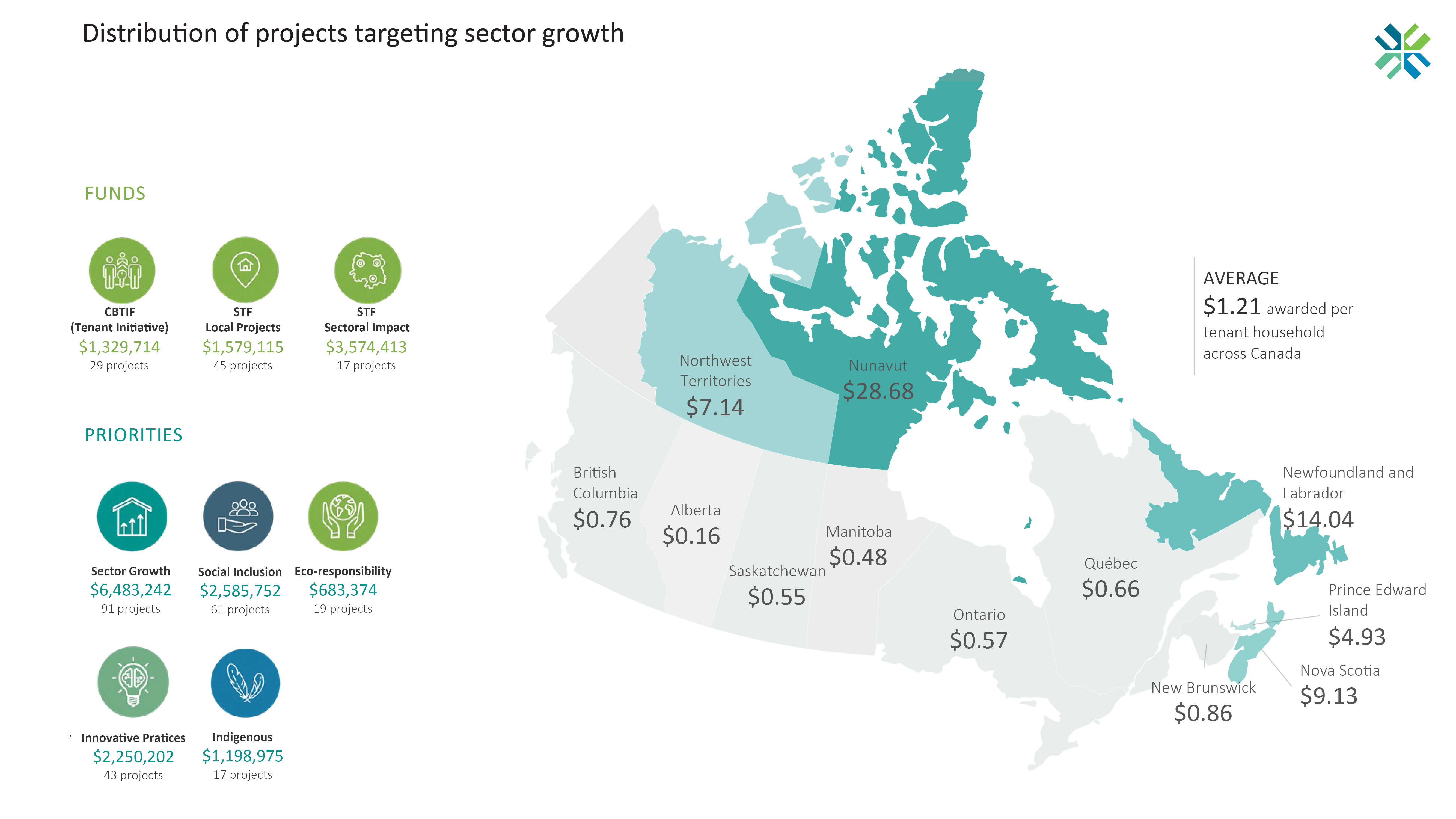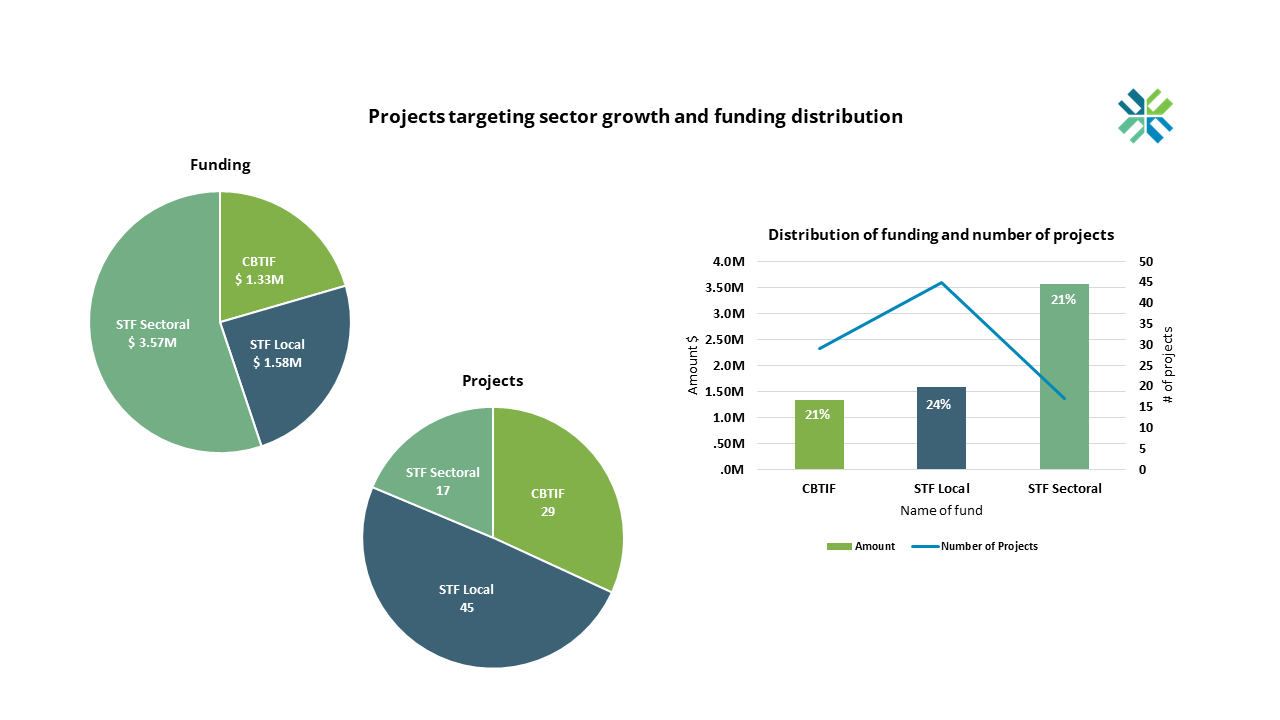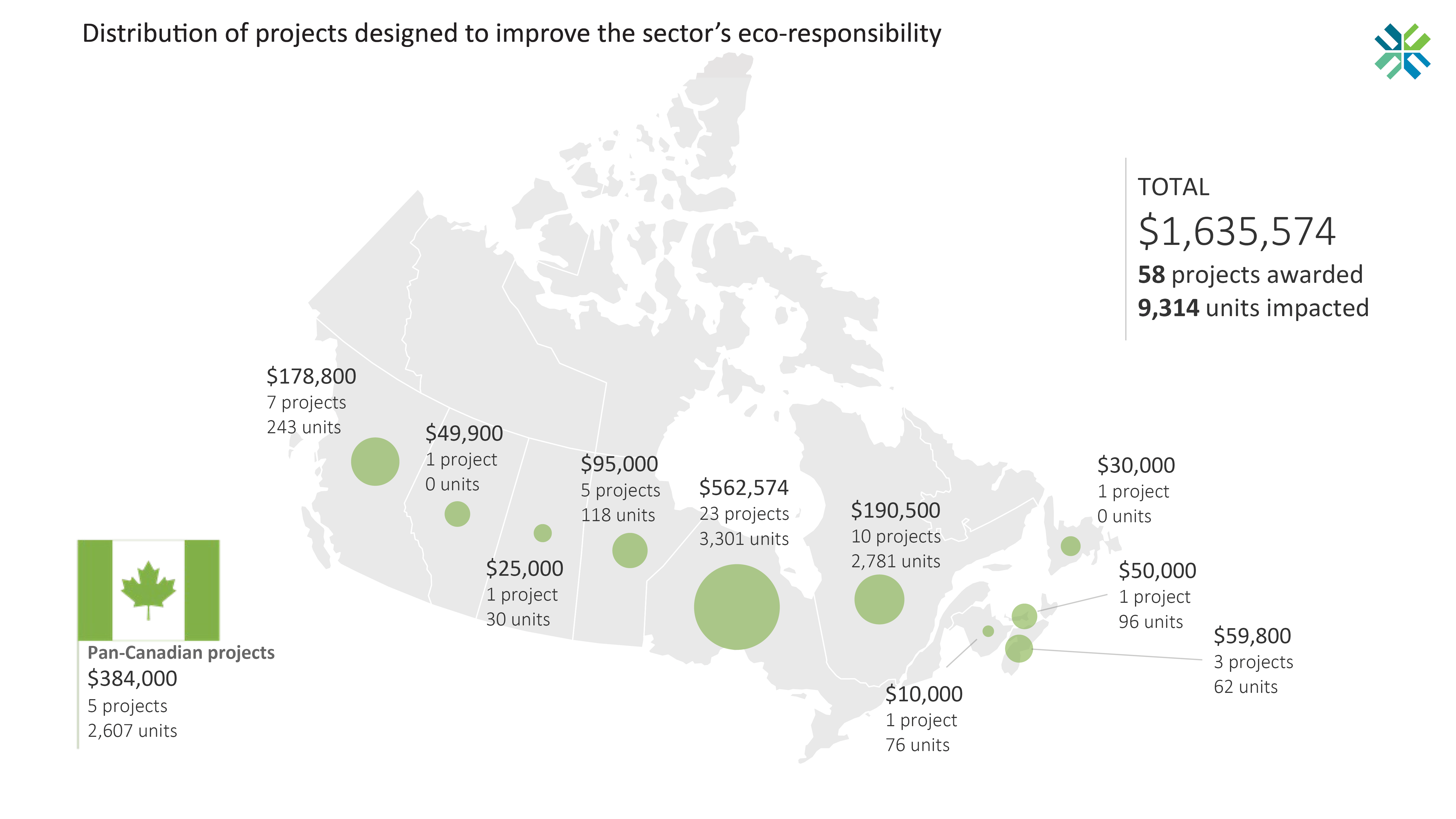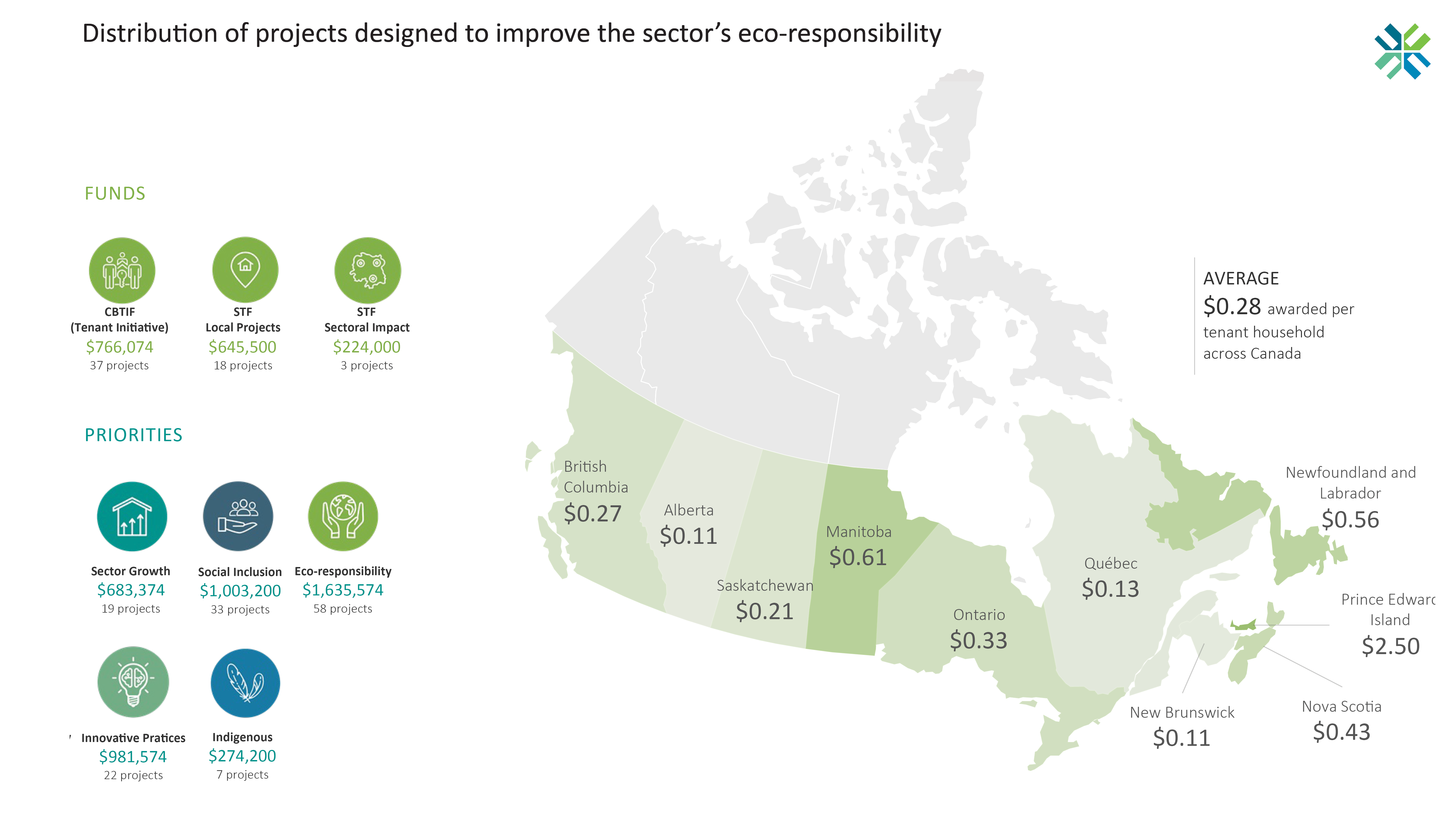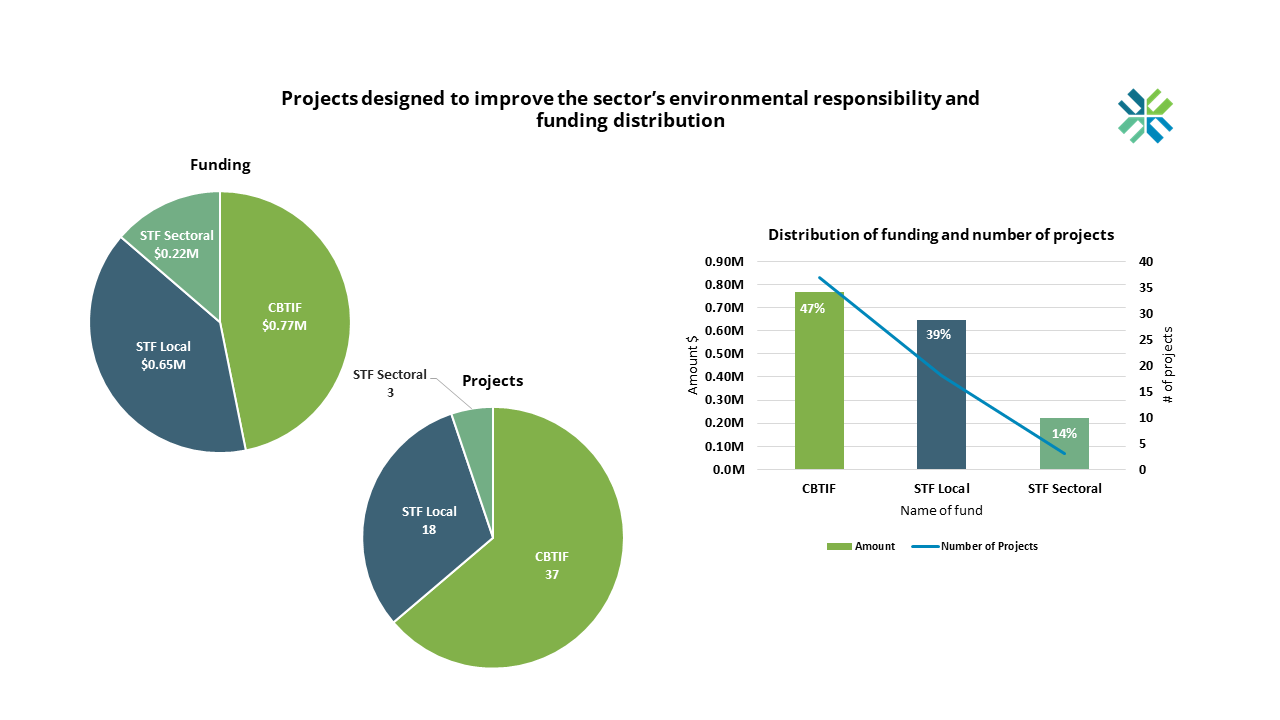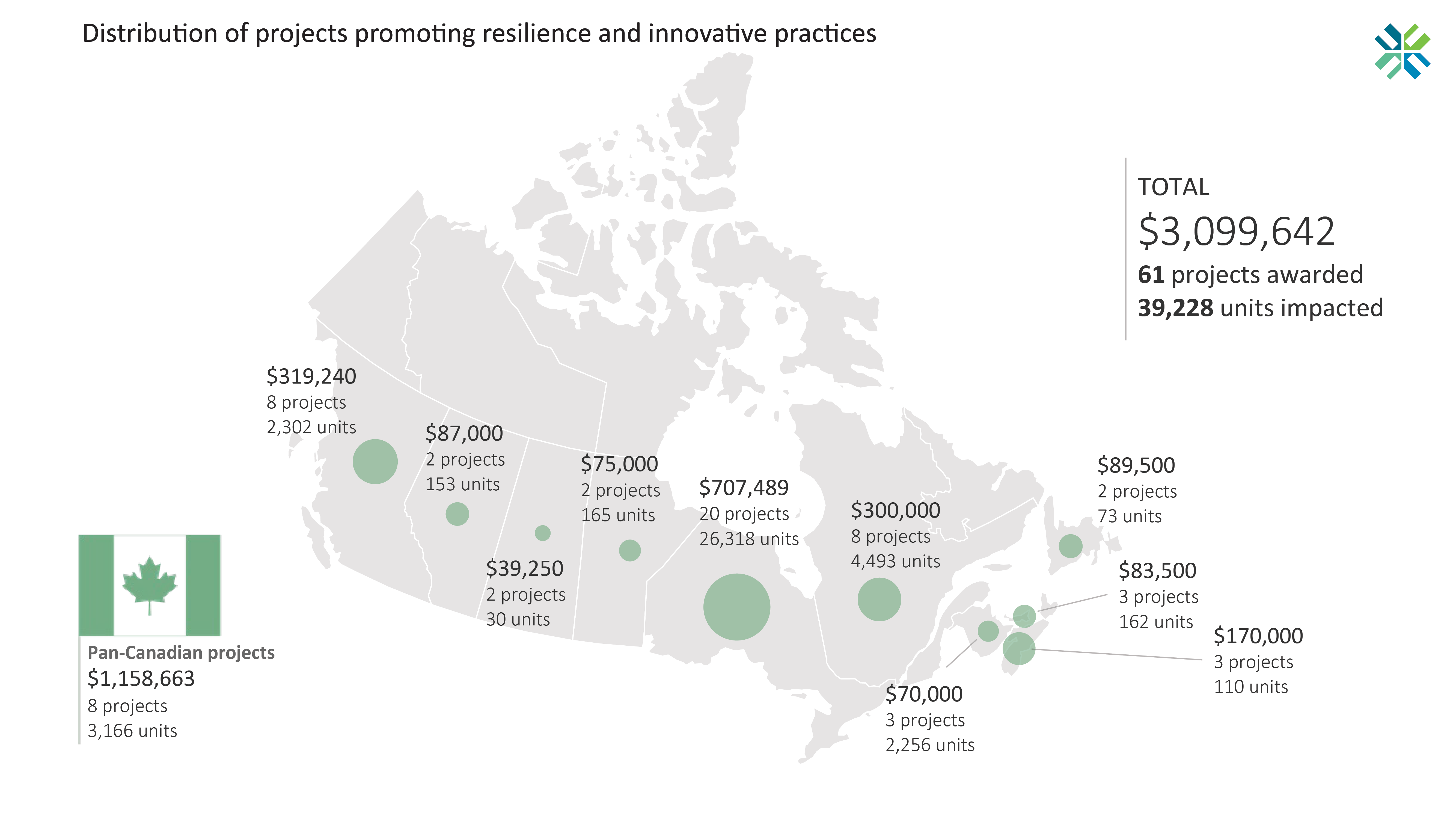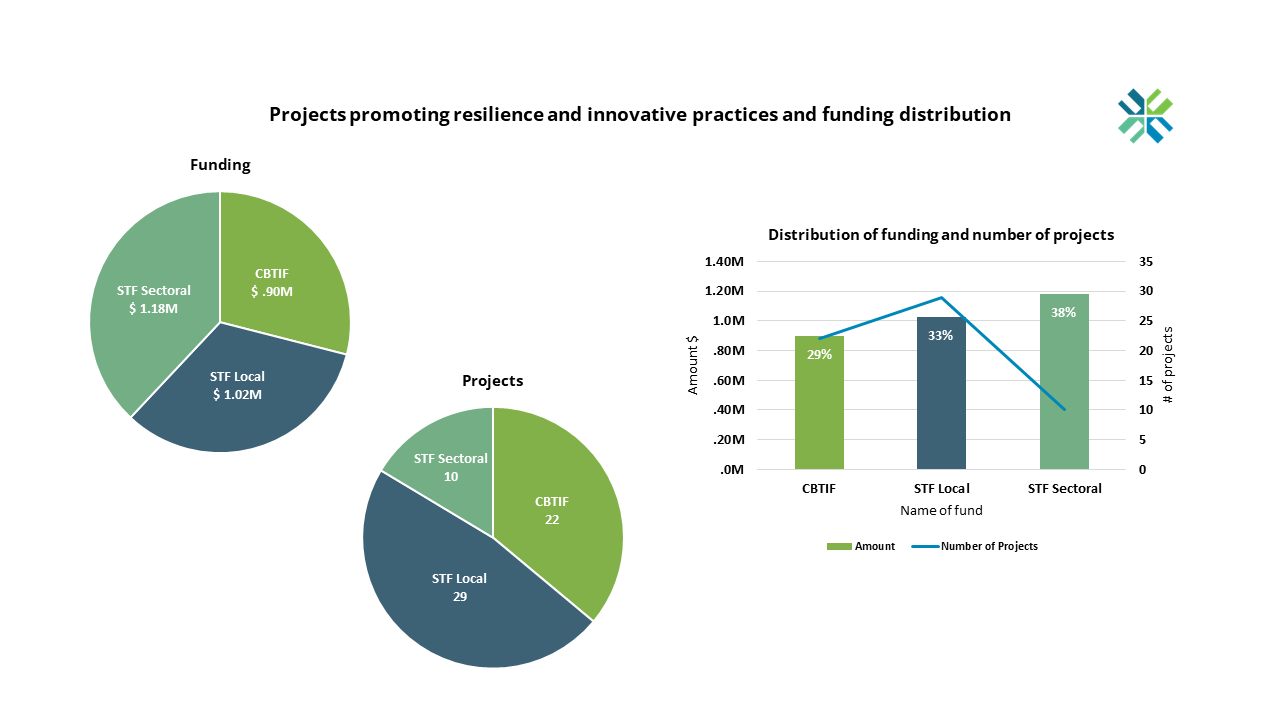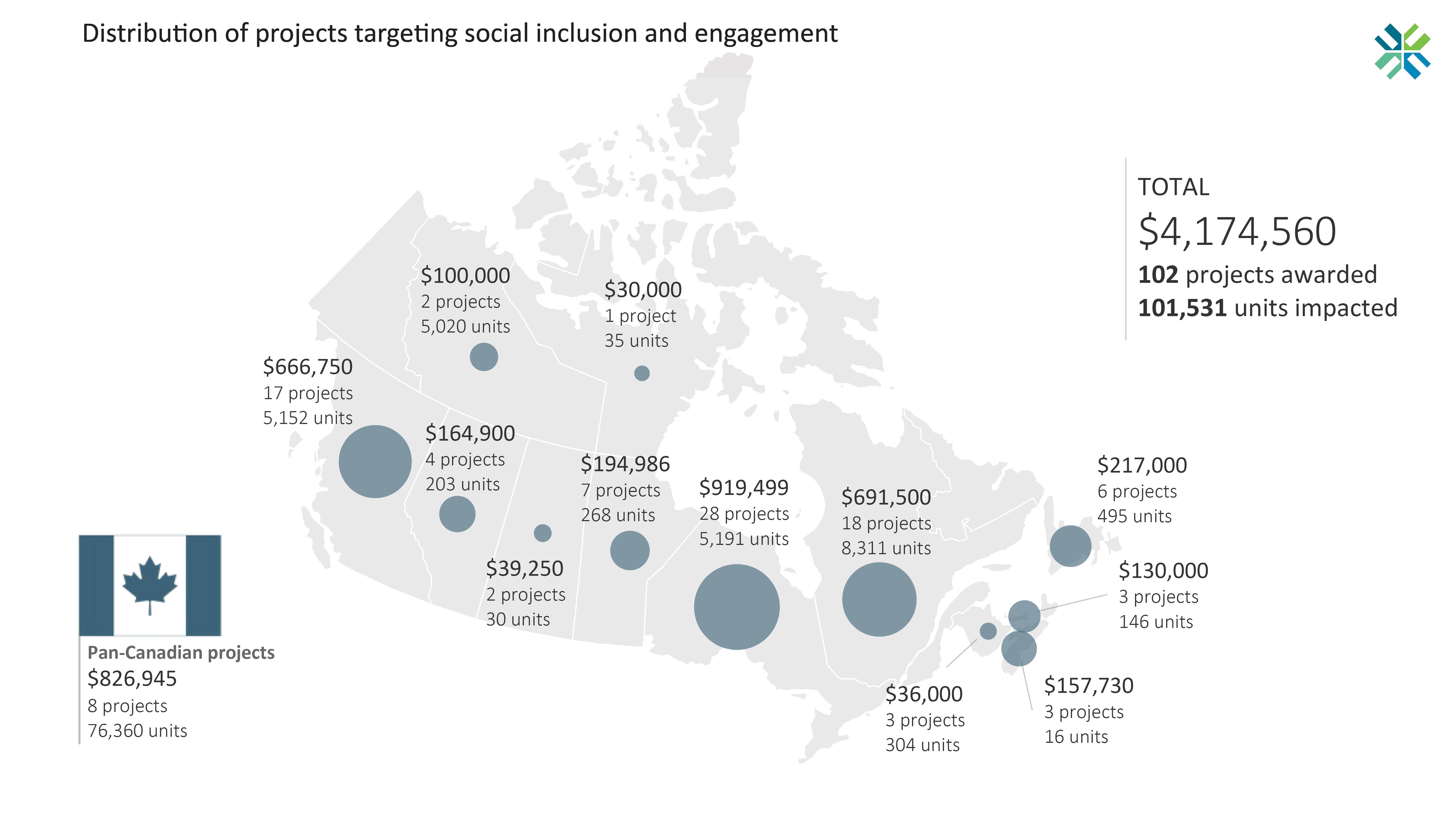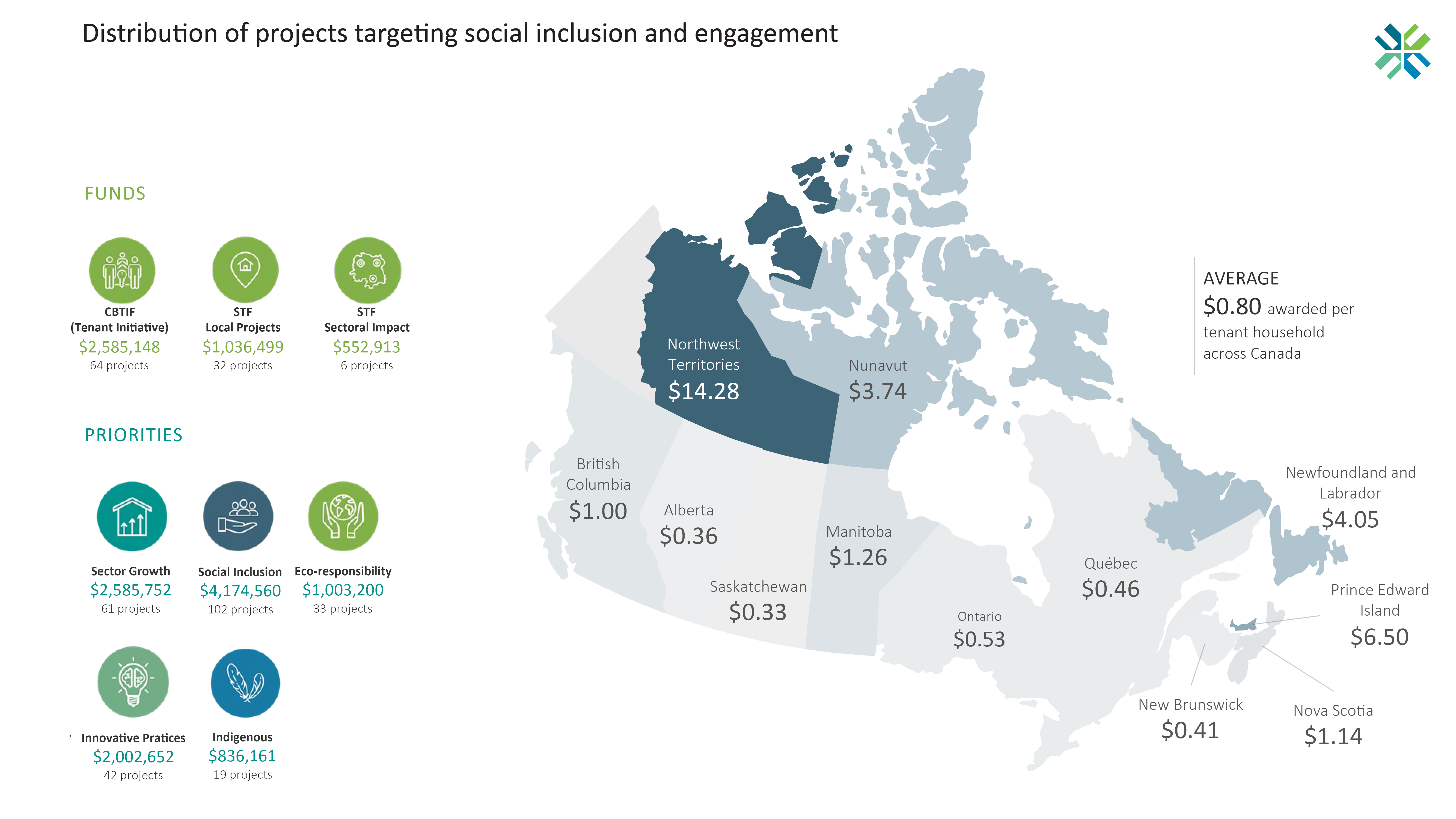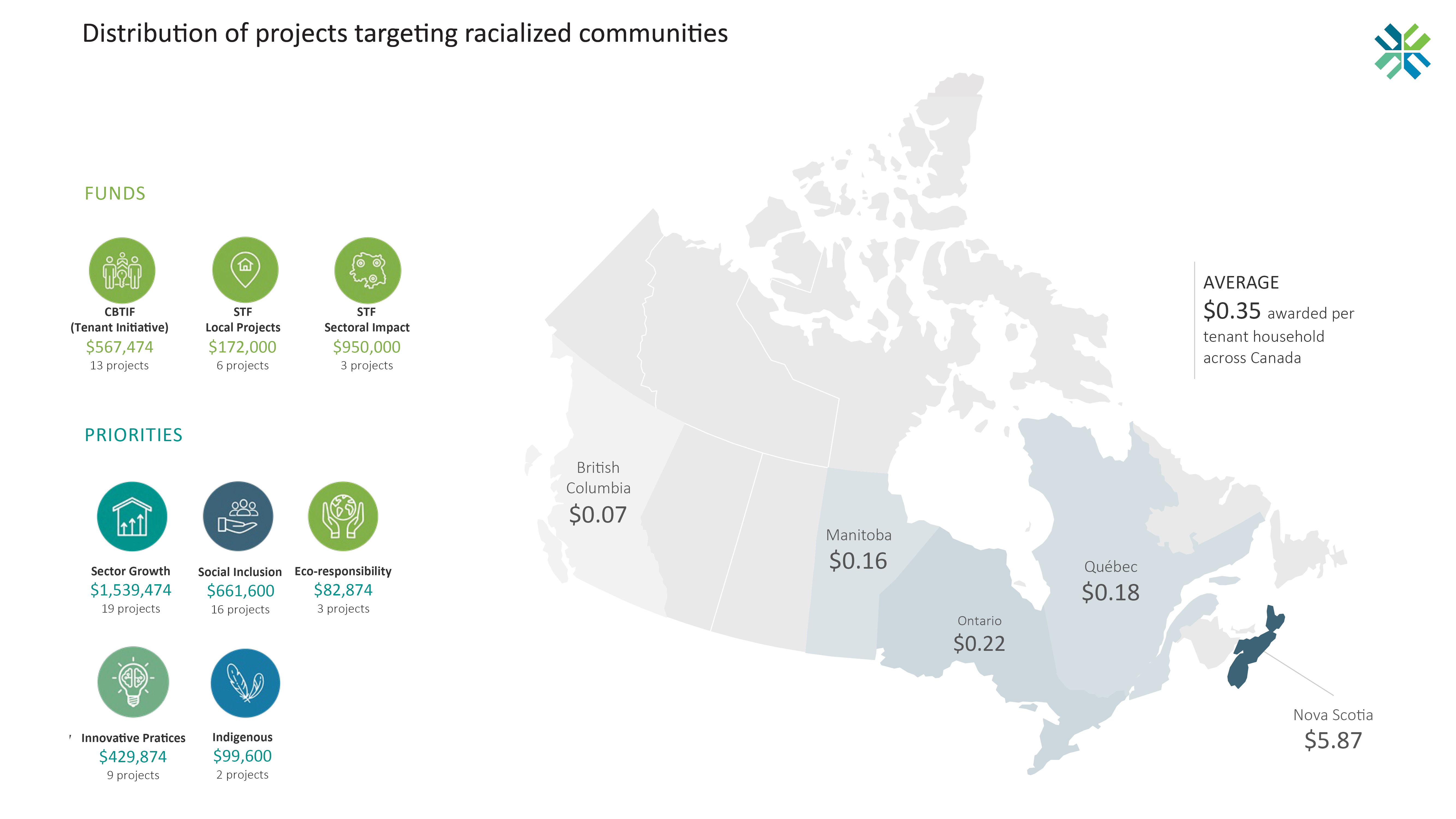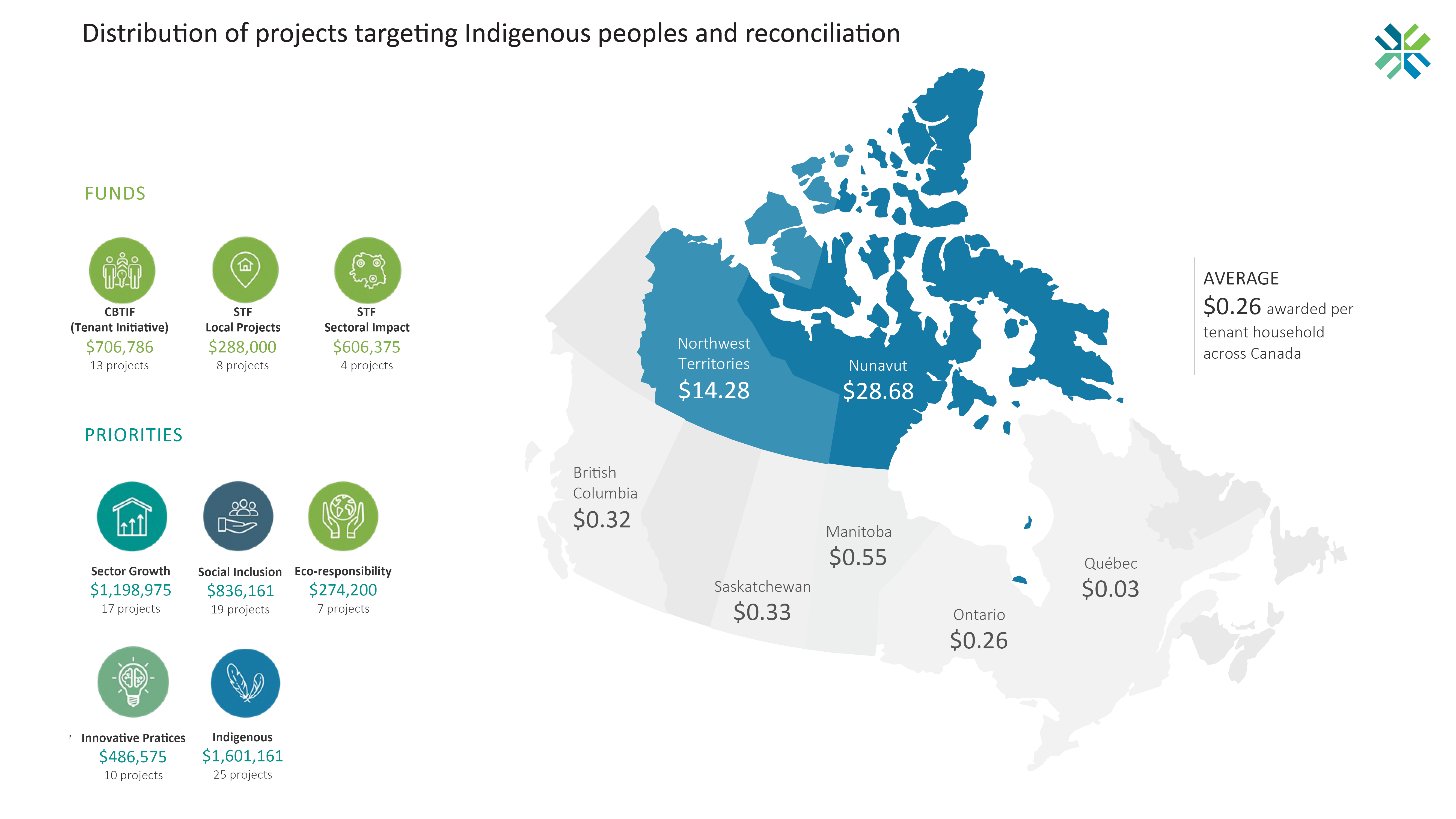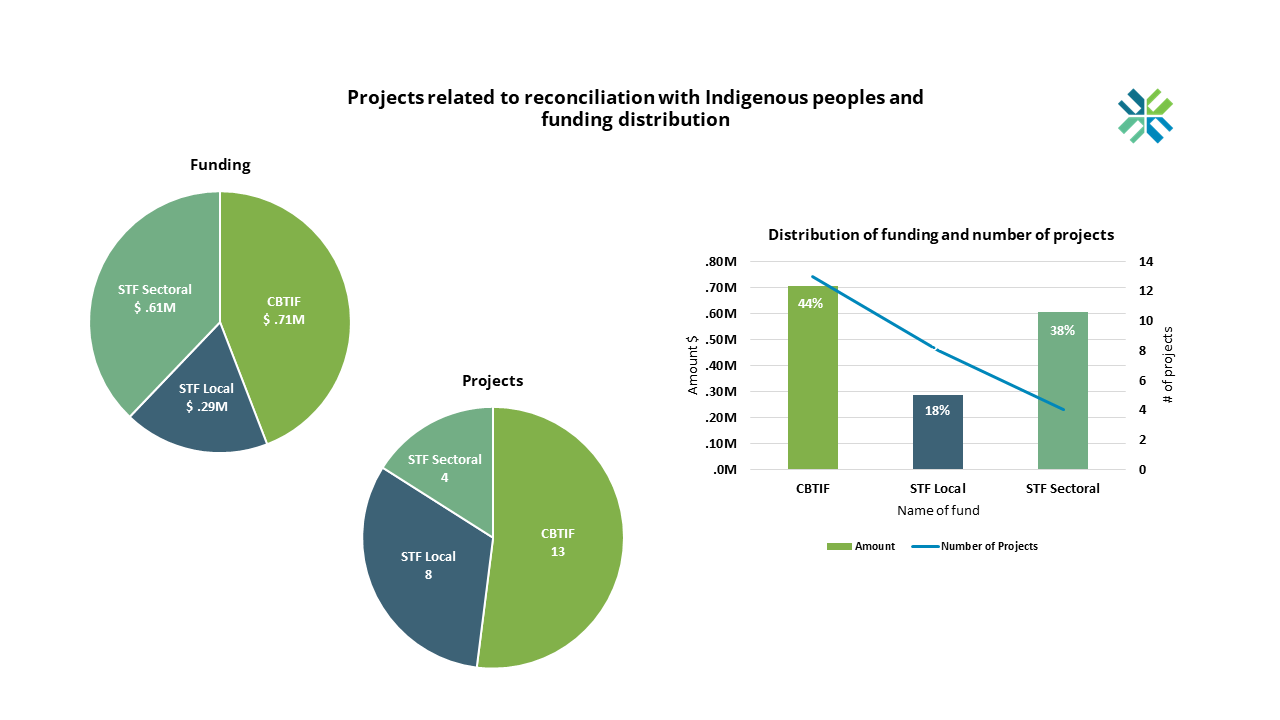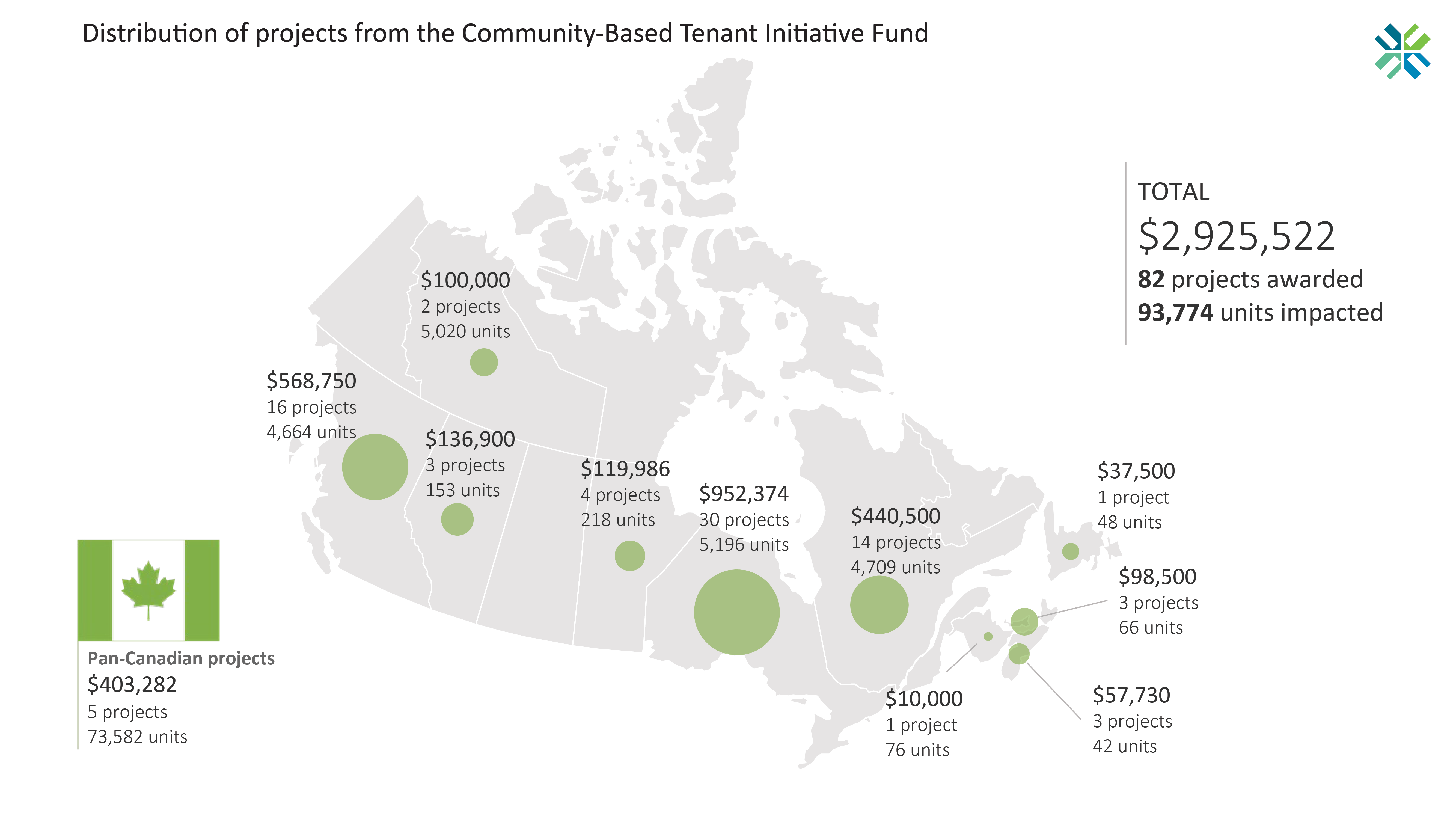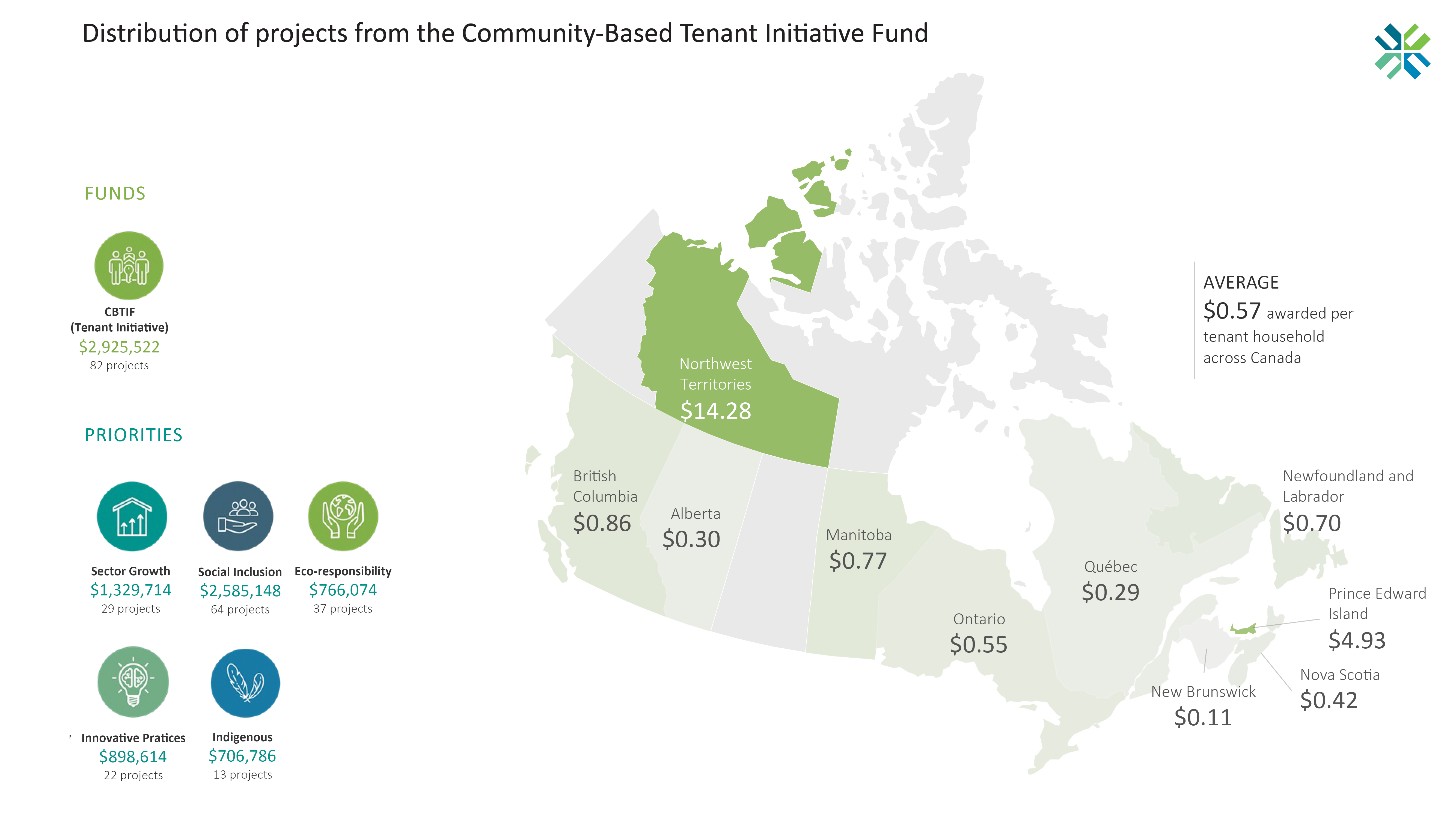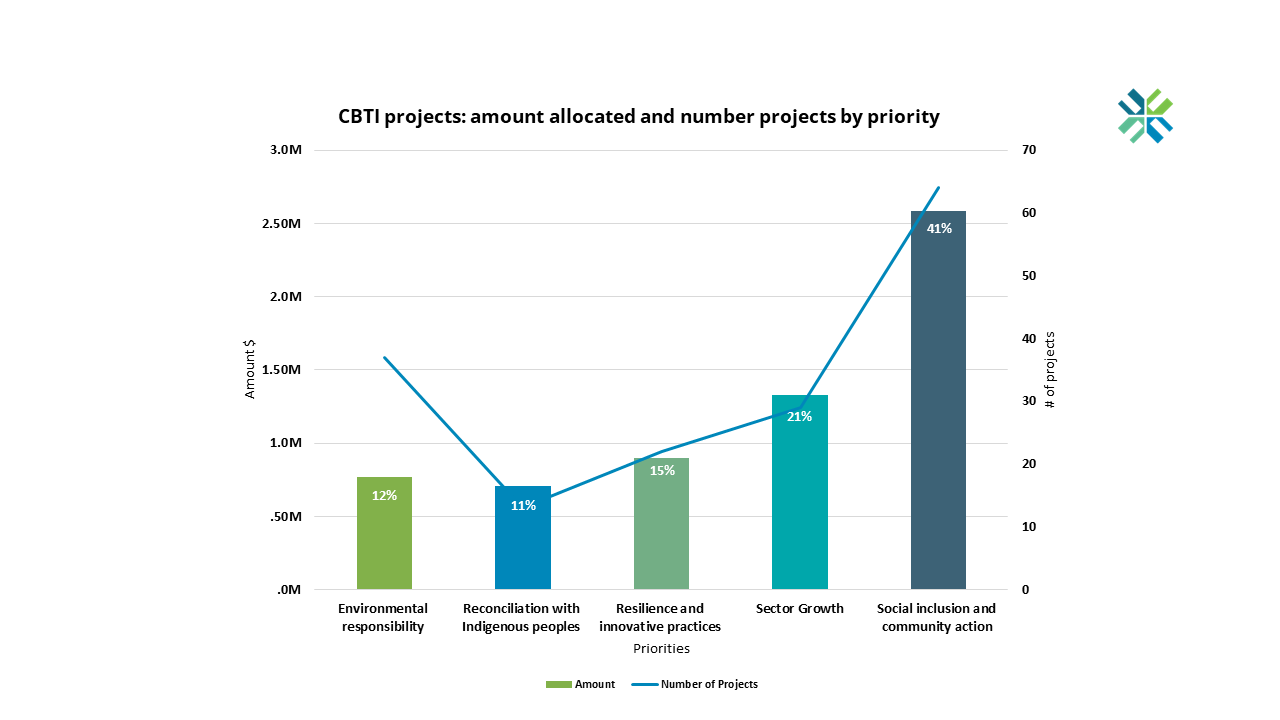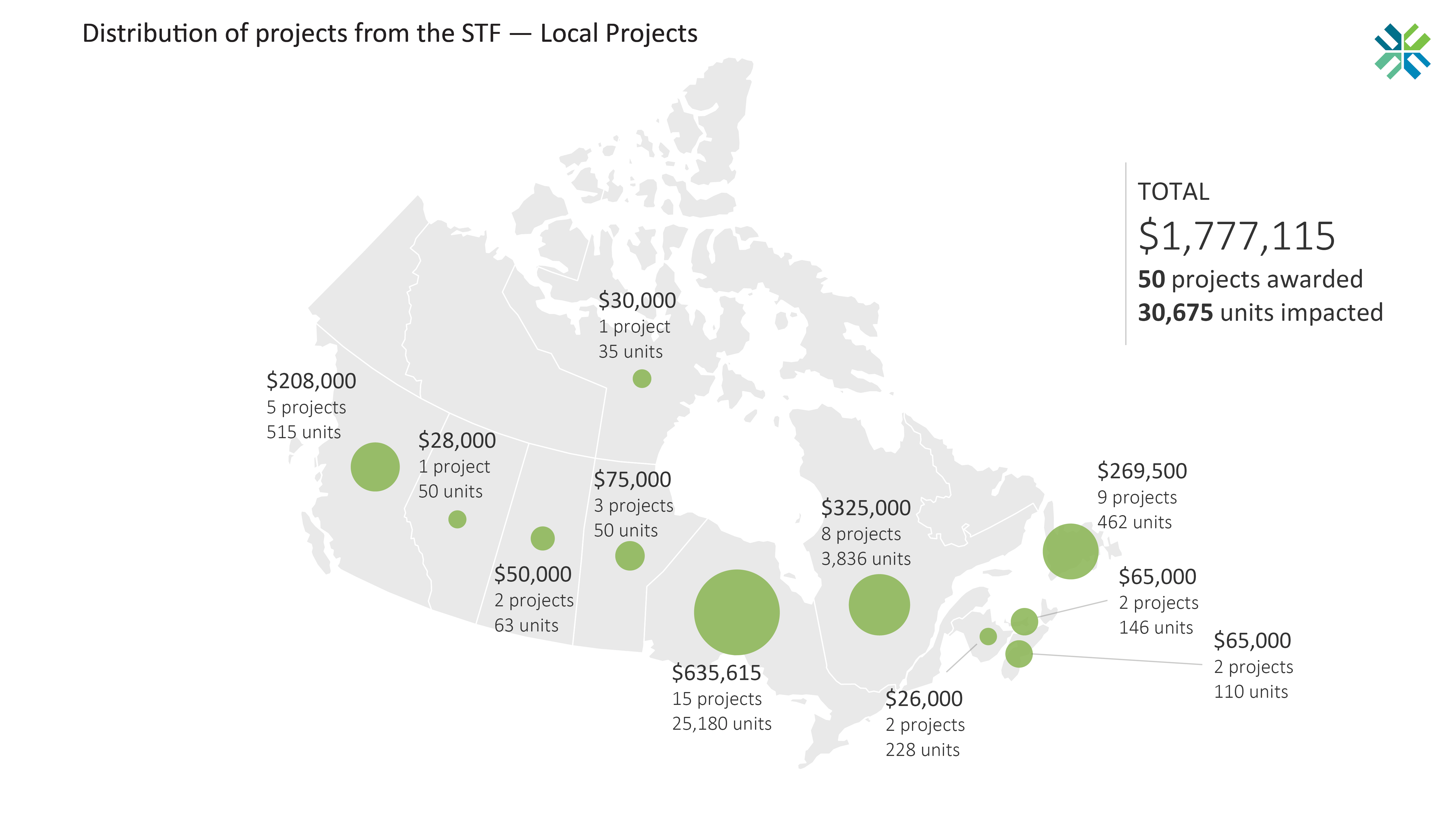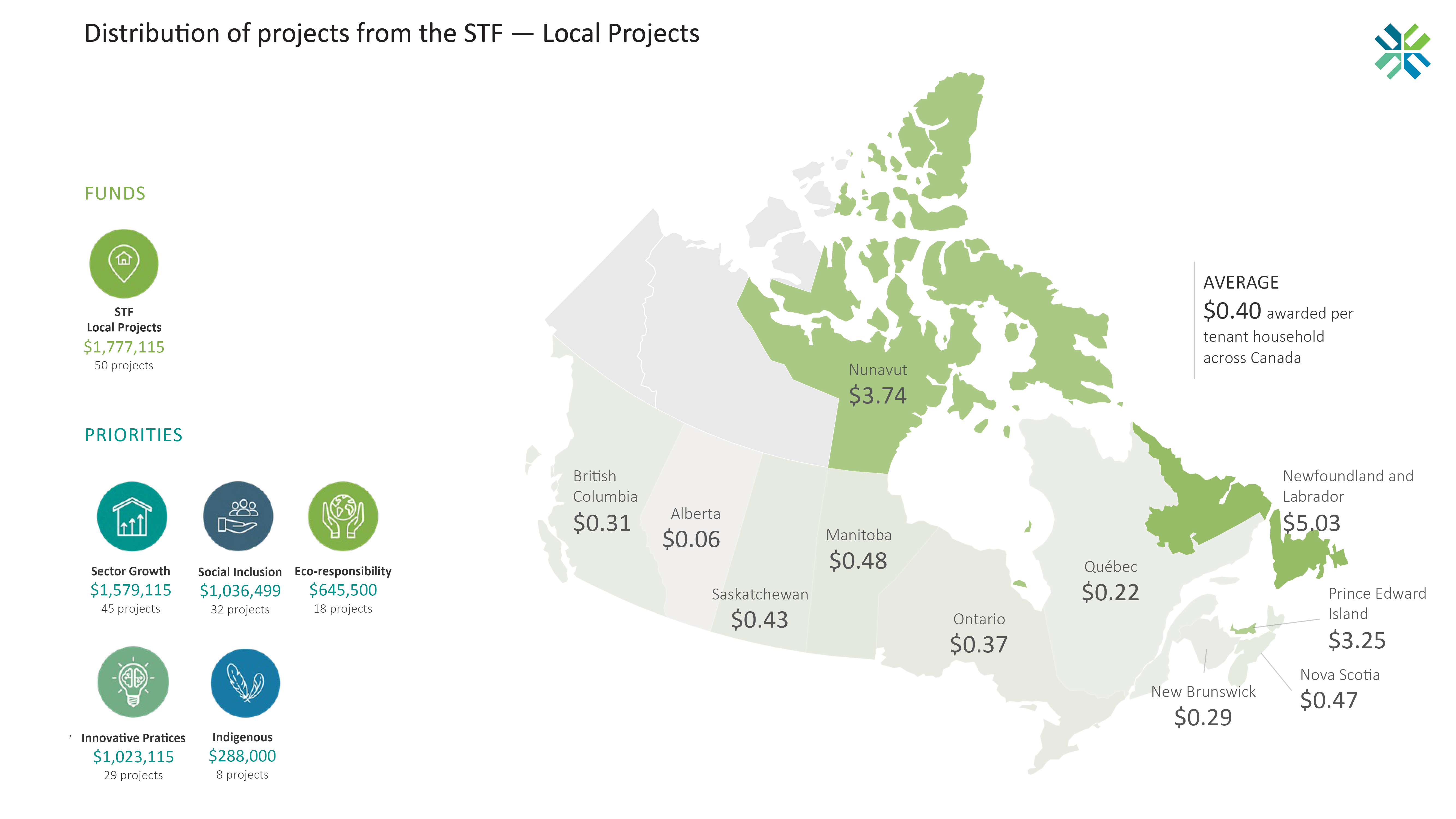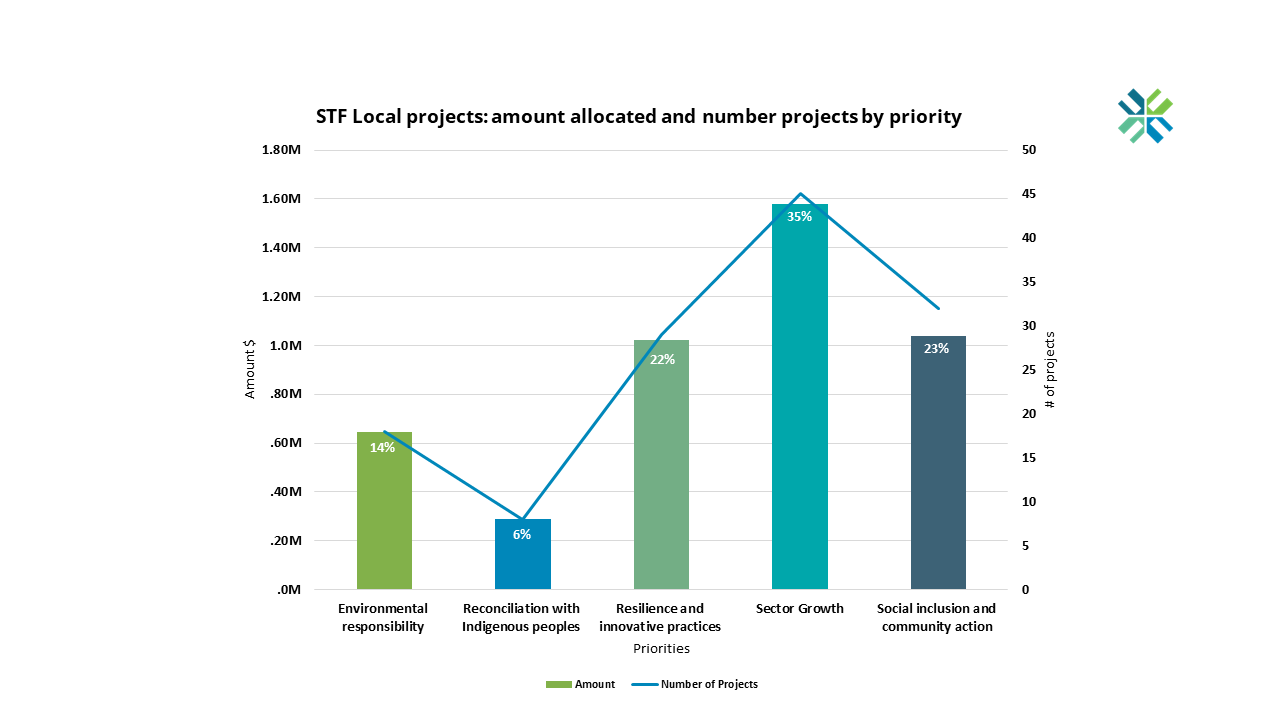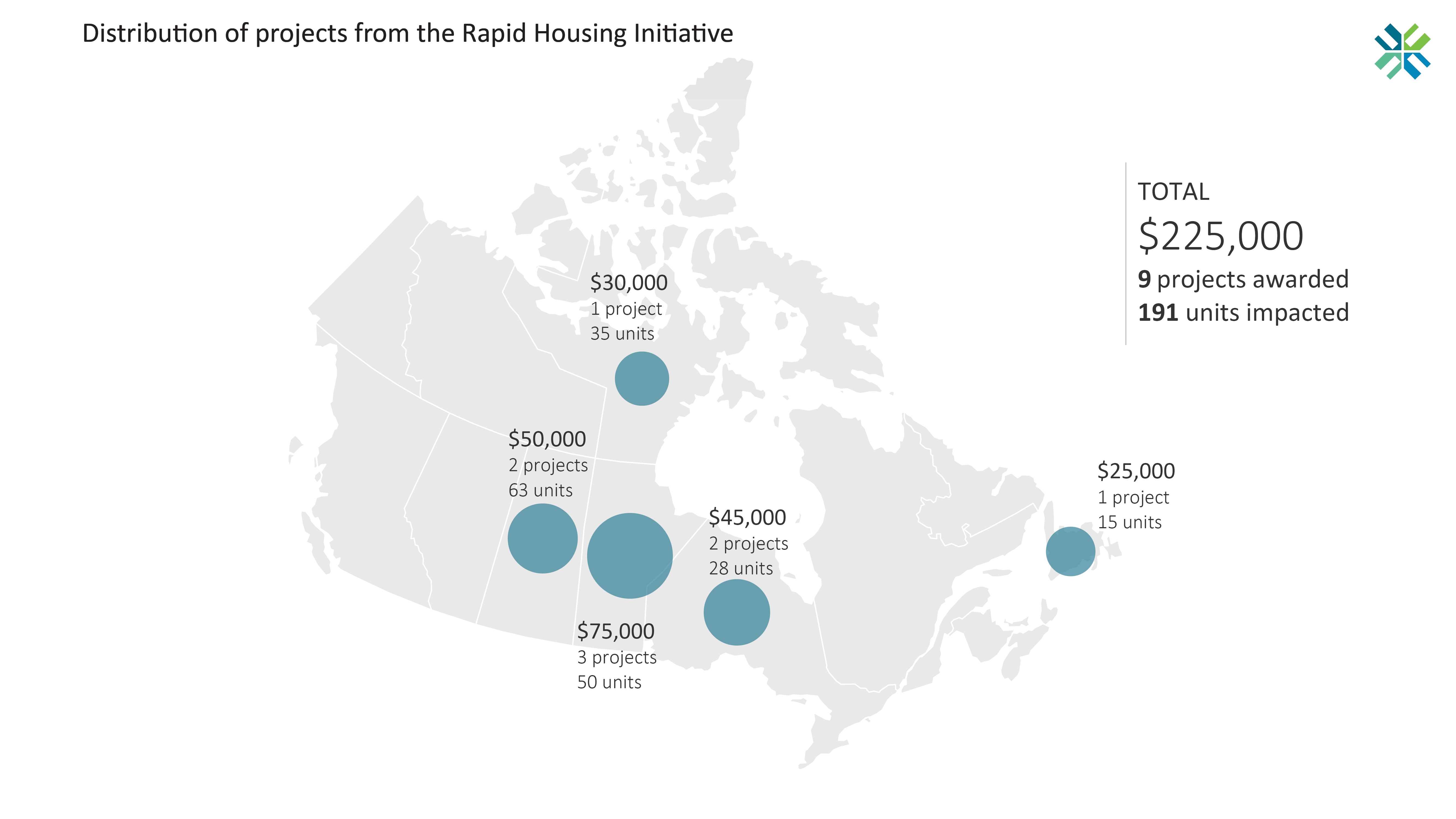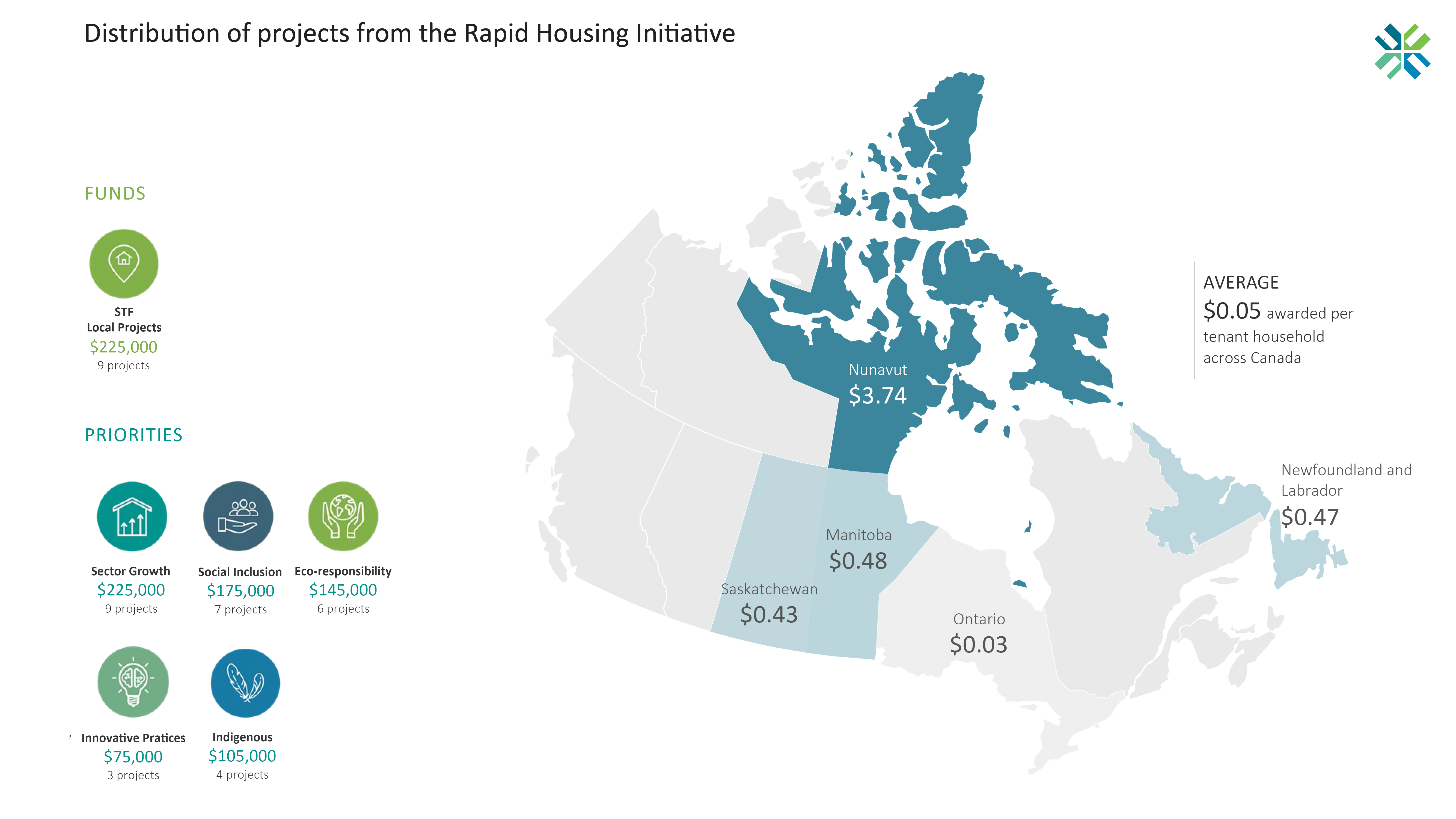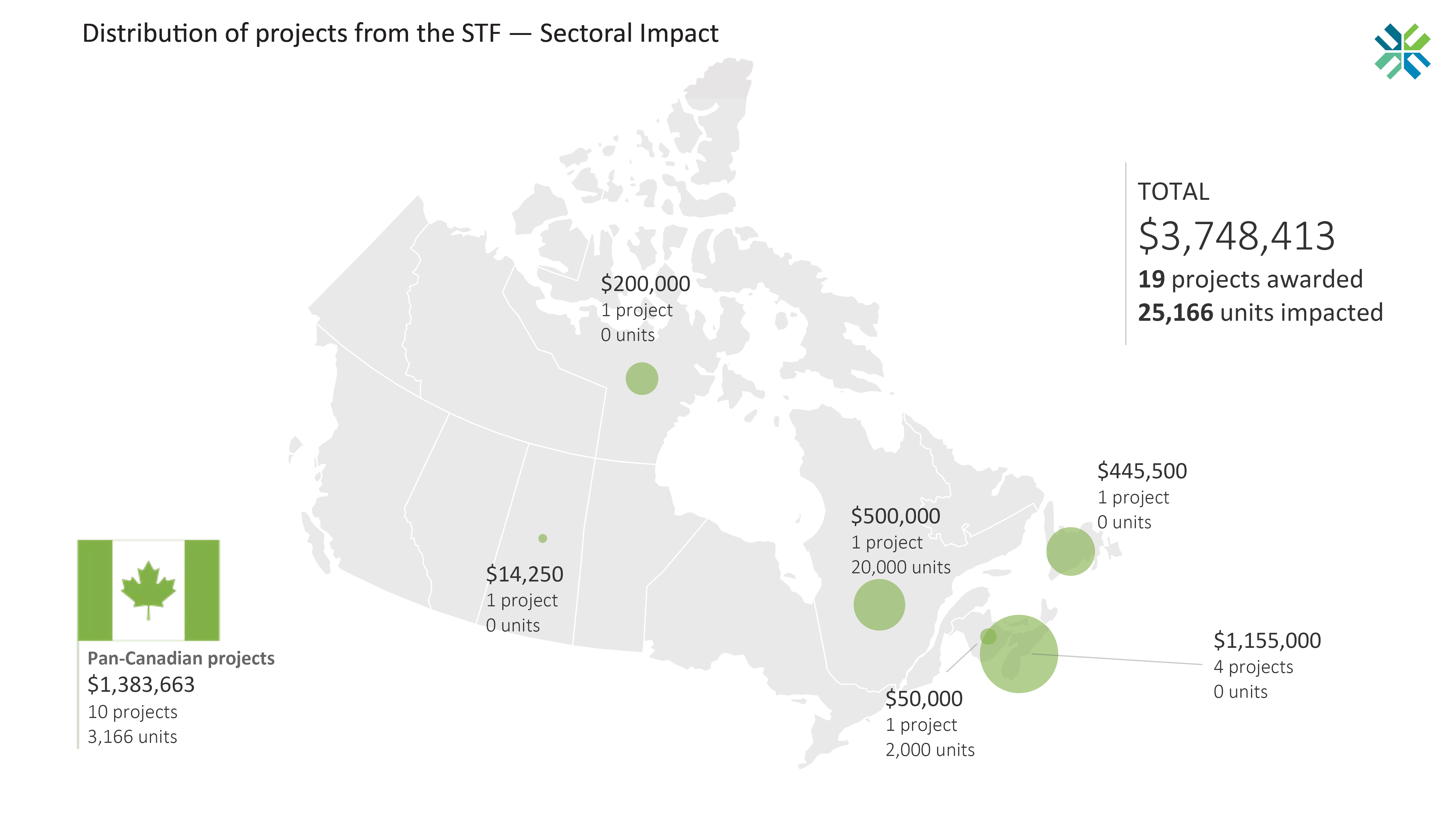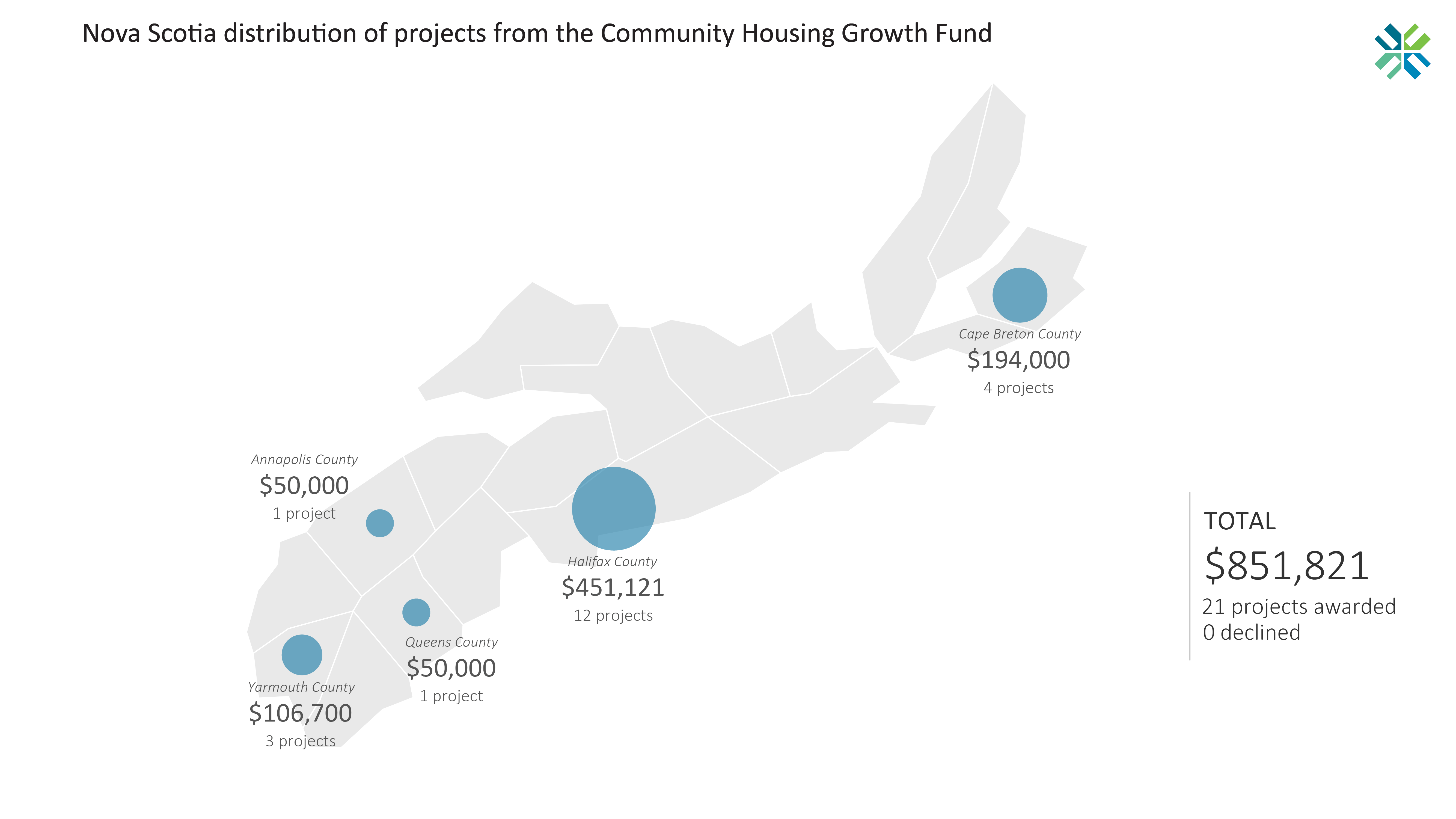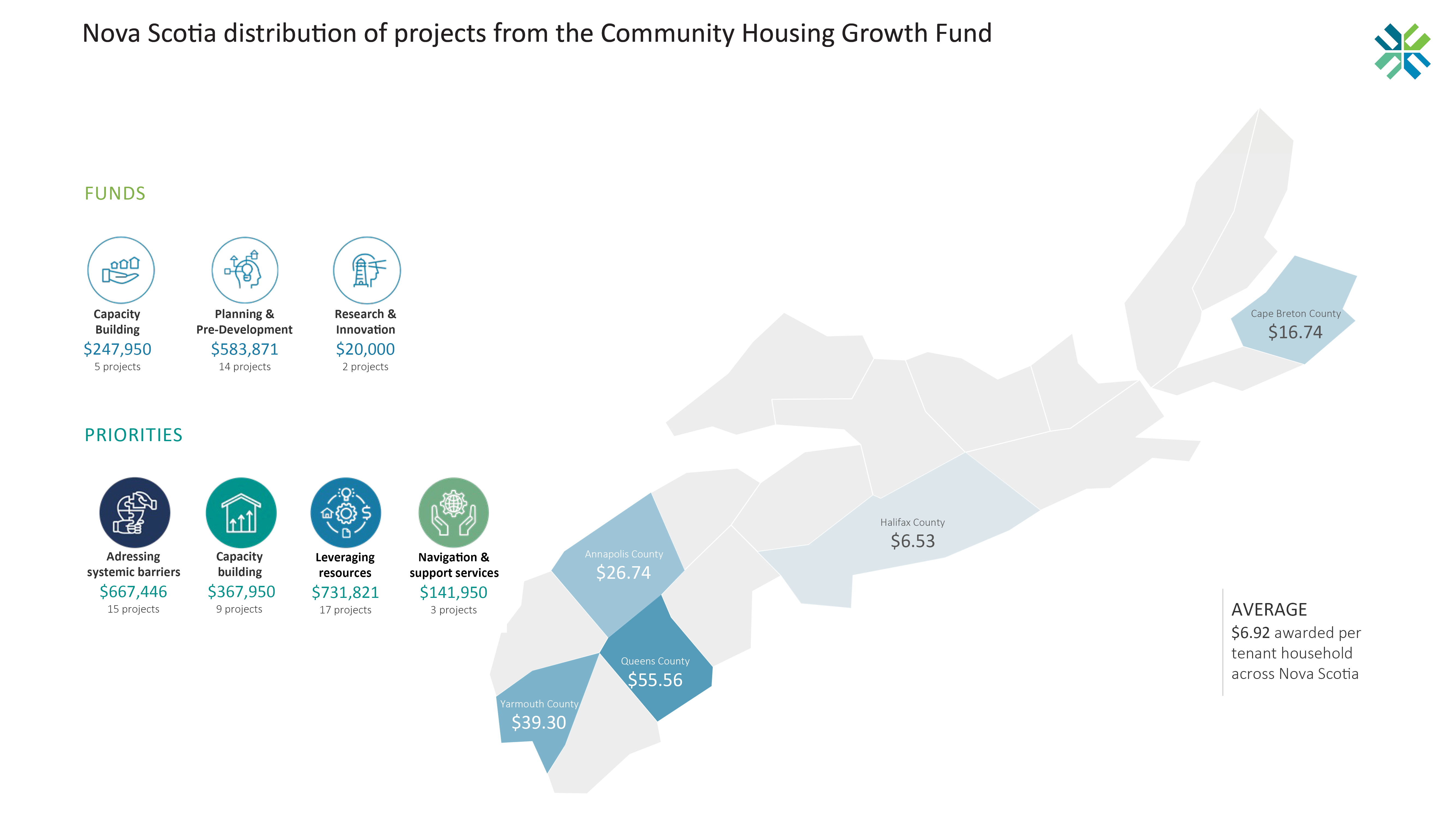Message from the President and the Executive Director

Jill Atkey
President

Stéphan Corriveau
Executive Director
Change of scale
Since 2000, “modernization,” “innovation,” and “capacities” have gained buzzword status in the community housing sector.
But the danger with buzzwords is that they can be used, overused, and abused to a point where they mean nothing and everything at once.
In part to avoid these buzzwords, our organization was named a “Transformation” Centre, as we want to carry the message that, as a sector, we need to reinvent ourselves while being true to our values of fairness, equity and democracy.
The good news is that according to our partners and numerous sector stakeholders across Canada, we are making significant contributions to move the needle towards the transformation of the sector. We are achieving this by using more of the sector’s own resources to leverage the significant, albeit insufficient, contributions committed by the different order of government to overcome the housing crisis.
Only 39 months separate December 13, 2019, the beginning of our operations, and March 31, 2023. But it feels like a decade if we concider the achievements accomplished with the support of the Centre. Reading this report provides ample evidence to support this feeling.
Over the last year, we engaged in more partnerships than ever with local housing providers, representative organizations, and several governments and agencies. Doing so allowed us to leverage our financial and expertise contributions to improve the sector’s future.
But as effective and efficient as we were, more is required to stop the dramatic disappearance of affordable homes in the for-profit market. This drop makes it harder and harder to correct the situation between people’s needs and the market’s ability to respond to the situation.
And still, equity-denied communities, particularly Indigenous and Black communities, are carrying a disproportionate burden as they continue to be disadvantaged in the housing system.
Correcting the imbalance will require more actions and diverse strategies than we have been doing as a Centre and a sector in the last few years.
This is why the Centre is undergoing a strategic planning exercise that will help us intervene in ways and on a scale that have not been seen in this country for several decades. The following pages provide insights into the Centre’s agenda for the next year.
To achieve this, the Centre relies on a committed and expert board of directors, a talented and dedicated team, and several engaged partners from coast to coast to coast.
Despite the enormous challenges ahead, our future is full of potential and the promise of success. A society where housing is genuinely considered a fundamental human right is within reach and our actions will only reinforce achieving that vision.
Jill Atkey, President
Stéphan Corriveau, Executive Director
Boldness and innovation as driving forces

In its fourth year, the Centre has established itself as a prominent player in the community housing landscape across Canada. The transformation is progressing well, but like any force acting on its environment, the Centre is also undergoing its own transformation!
2022-2023 was defined by a series of transitions for the Centre. First, the federal role is diminishing as a source of funding. This was expected since the National Housing Strategy, which gave birth to the Centre, is set to expire in 2028. As per our contract with CMHC, we are currently entering midlife and we are expected to transition into downsizing management mode. However, we firmly believe that 10 years is not enough to accomplish our mandate properly. Completing the transformation of the housing sector will require more time. Therefore, as per its nature, the Centre chose the path of resilience, innovation, and growth. In this spirit, we are working on developing agreements with the provincial and territorial governments to fund part of our activities.
Until now, the Centre was primarily seen as a funding organization, which facilitated our efforts to be established and well known. However, the Centre’s ambition goes beyond that as we aim for the sector to play a leadership role in Canadian society. To achieve this, the sector must undergo a paradigm shift and embrace a radical cultural transformation. This year, the Centre has reassessed its approach to allocating funds and has prioritized initiatives that enhance our sector’s capacity for action.
We must avoid the trap of comfort and habits. Instead, we must foster a strong appetite for boldness and innovation. We believe this reframing is necessary to ensure the long-term sustainability of the sector. Community housing should be a desirable housing model for all, rather than a temporary or shameful solution. Part of the answer, in terms of empowerment and building our capacity to act, lies in leveraging our resources.

Reactive
Catalytic
In this context, we would describe the Centre’s intervention as catalytic. We act, depending on the case, as a facilitator to provide the community with the means to carry out this common project (to set up an association or a federation, for example) or as an actor. In the latter case, it is the Centre itself that carries out the action (for example, by creating a self-assessment grid, by offering the computer infrastructure for a shared service, etc.).
Propositional
For this type of intervention, the Centre plans the discussion, facilitates it and contributes to the identification and eventually the joint operationalization of the conclusions collected from that discussion.
Pyramid of action dimensions
As we said in last year’s report and to achieve the desired radical cultural transformation, The Centre’s intervention has resolutely shifted towards the higher levels of the pyramid above.
The year 2022-2023 was characterized by an increased focus on catalytic and propositional projects. We believe that these initiatives will drive growth and stability to the sector. They are also the ones that will enable the large-scale interventions necessary to address the housing crisis.
Catalyzing the growth of the community housing sector
The Centre’s vision is for the sector’s players to transform community housing and extend the model as widely as possible across the country. This is why it has set for itself the mission of catalyzing growth, resilience, sustainability and inclusiveness.
The Centre’s actions revolve around several key levers, including fostering innovative and impactful partnerships, strengthening capacities through grants and training activities, and empowering the sector’s stakeholders through the sharing of knowledge and tools.
Plancher: Coming together to increase our power of action and push forward community housing

Working together makes us stronger and better, both individually and collectively. In our society however, collective land ownership is disadvantaged by various taxes and civil laws, while private and speculative land ownership is encouraged and supported. The Plancher project aims to revolutionize this by providing community housing with the same advantages the for-profit sector enjoys. It also innovates by encouraging the sector to use the fruits of 50 years of collective investment and community work as leverage to propel itself into the future.
Planned since September 2021 and launched in May 2022, Plancher continues to generate strong interest in Quebec. Its primary goal was to engage community housing stakeholders in envisioning a project that would foster expansion and resilience. The discussion quickly came to focus on pooling and the idea of pooling our assets.
The collective ambition of Plancher is to enable a growing number of people to live outside the speculative market and reduce the cost of rents.
Its sectoral ambition is to substantially transform affordable housing funding in Quebec. The aim is to create a financial tool that pools the financial capacities of the community’s real estate assets to increase the power of collective action. With this tool, it would be possible to develop and maintain social and community housing in a more flexible manner.
On October 6, 2022, a new phase of work was initiated with this objective in mind. A group of partners, including representatives from community housing providers, funders (municipalities, governments, foundations), and funding partners (such as Fonds de solidarité FTQ, Fondaction, and Caisse d’économie solidaire Desjardins), gathered on a regular basis until spring 2023 to define the business model(s) of the financial tool. The Centre also retained the services of the Favreau Immobilier inc. and Brodeur Frenette teams to assist with the planning and implementation of the project.
We now have commitments for tens of millions of dollars in private and philanthropic investment; thousands of community housing units have been pledged by their owners as collateral; and several community developers are piling up projects on our doorstep to take thousands of units off the speculative market. Furthermore, municipalities have passed resolutions in support of Plancher, explicitly urging the provincial and federal governments to provide their support.
The success of Plancher would grant community housing the same flexibility that the for-profit sector has in acquisition, construction, and renovation projects. However, to achieve this at the desired scale, legislative amendments, and modifications to operating agreements are necessary. Government involvement is still lacking, but discussions have begun.
In addition, this energy extends beyond Quebec, and several provincial organizations and governments have initiated discussions with the Centre to evaluate the potential within their respective jurisdictions.
The Growth Fund: Building sector capacity

Since its establishment, the Centre has consistently demonstrated its ability to design program development and implementation processes adapted to a fast-changing reality. This expertise has given birth to our latest innovation: the Growth Fund model.
Now a flagship project of the Centre, the Community Housing Growth Fund (CHGF), is a funding model originally developed for Nova Scotia in collaboration with its provincial government. Like Plancher, it a revolution for the province with serious potential for widespread use across the country.
The model stands out for its agility, drawing on the expertise and flexibility of the community housing staff. Most grant programs take considerable time to set up and deliver, the Growth Fund model however, opts for a flexible and dynamic approach to its operations.
While the Centre takes on the role of managing the operationalization strategy and funding allocation, the government sets targets and monitors the achieved results. This collaborative approach, combined with the Centre’s effective IT infrastructure, has demonstrated the ability to act swiftly while successfully meeting targets.
The Nova Scotia community housing sector has welcomed this fund with enthusiasm. With the increasing pressure to address the growing housing crisis and limited alternative funding sources available, the provincial government’s support for the sector through the Community Housing Growth Fund (CHGF) is timely.
The groups whose applications have been approved under the CHGF Planning and Pre-Development stream have emphasized its importance given the scarcity of funding sources for these activities. This component of the fund received the highest number of applications (67%) in 2022–2023.
Given this success and just a few months after the allocation process was launched, the Nova Scotia government decided to improve upon the agreement. In addition to the initial $2 million available over two years, there will be an additional $2.5 million and a two-year extension of the CHGF.
This success has attracted the attention of several governments, and in late March, the Centre signed a new agreement for the establishment of a Growth Fund in Nunavut.
The Nunalingni Piruqpaalirut Fund (Growth in our land fund), created in partnership with the Nunavut Housing Corporation as part of its Nunavut 3000 Strategy, will be launched by the end of 2023.
For more information on the Nova Scotia CHGF, see Funds.
For more information on the Nunalingni Piruqpaalirut Fund, see Reconciliation.
The Organizational Compass and the Resource Inventory: Empowering through sharing knowledge and tools
Rebranded as the Organizational Compass, the self-assessment tool for housing providers marked a significant innovation for the Centre in 2021-2022. However, it was not until early 2023, following the website redesign, that we actively began promoting it.
The Compass enables housing providers to establish foundations for strategic planning with minimal effort and at low cost. Consequently, it fosters organizational capacity.
Several associations and federations perceive it as an opportunity to gain a better understanding of their members’ reality. The data aggregation functionality facilitates the implementation of customized service offerings, financing options, and advocacy work among others.
Thus far, participants have provided highly positive feedback, emphasizing the tool’s impressive precision in recommending actions. The Organizational Compass will be promoted throughout 2023-2024.
The Resource Inventory brings together a wide range of tools that are valuable for groups in the sector. These resources have been meticulously chosen for their relevance and quality, covering topics such as environmental practices, inclusion, and tenant advocacy. Many of them are closely aligned with the themes addressed in the Organizational Compass, such as governance, finance, building management, and community relations.
Currently, the inventory contains close to 1,000 resources collected from over 205 organizations. Additionally, it includes a collection of thematic kits that cater to specific needs, such as development or tenant rights. The inventory will continue to expand and enhance over time.
The year 2022-2023 in numbers
The Centre allocated more than $8 million* in 2022–2023 supporting 151 projects across Canada. In total, these projects benefited nearly 150,000 households.
Projects in urban and rural Ontario received a sizable portion of the funding with over $1.5 million, followed by Nova Scotia and Quebec, with approximately $1.3 million each.
The national average per household is $1.54. The average is higher in the Territories and the Atlantic provinces.
* This amount does not include amounts allocated through the Nova Scotia Community Housing Growth Fund. For more details, please refer to Funds.
Centre priorities

Growth of the sector
From 2011 to 2021, according to data from the latest federal census, for every unit developed by the community housing sector, 23 affordable housing units were lost to the for-profit market. These alarming figures demonstrate the need for a change of scale, because far from bringing us closer to a solution to the crisis, our collective choices are taking us further away from it.
We need to take action to accelerate the growth of our sector with large-scale, innovative initiatives. Moreover, a radical cultural transformation is needed to position community housing at the forefront of the housing context transformation.
The Centre’s team worked diligently throughout 2022–2023 with these objectives in mind. Growth has been a central theme in our activities to develop initiatives and partnerships. It has also been a significant focus in our communications and networking events.
The power of combined strength as a lever for growth
By establishing the Nova Scotia Non-Profit Housing Association (NSNPHA) in the fall of 2022, Nova Scotia’s NPOs and cooperatives have made the decision to fuel their growth by pooling their resources.
This accomplishment is the outcome of two years of dedicated efforts by the Centre’s team, along with partners at St. Francis Xavier University and the Nova Scotia government. The NSNPHA was established with the help of a $625,000 investment from the Nova Scotia Community Housing Growth Fund.
Projects targeting sector growth
A substantial portion of the funding allocated by the Centre in 2022–2023 was dedicated to projects that supported sector growth, with 91 projects worth a total of $6.5 million. More than 130,000 units were impacted.
55% of this funding comes from the sectoral impact stream of the Sector Transformation Fund (STF) with 17 projects, 24% from the local stream of the STF with 45 projects and 21% from the Community-Based Tenant Initiative fund (CBTI) with 17 projects.
These figures illustrate the Centre’s commitment to promoting growth at both the sector-wide level, in terms of the amount of its sectoral impact funding, and the individual organization level, in terms of the number of local projects funded.
On average, $1.21 was allocated to sector growth projects per tenant household in Canada. The amounts allocated per tenant household ranged from $0.16 in Alberta to $28.68 in Nunavut.
In the spotlight
Building development capacity through mentorship
Centretown Affordable Housing Development Corporation (Cahdco) is spearheading the development of a program aimed at empowering housing providers from all corners of the country to enhance their capacity for development. This comprehensive program consists of two distinct phases, each designed to address different aspects of skill-building and knowledge sharing.
In the first phase, Cahdco will focus on engaging housing providers and collaborating with them to co-create a detailed curriculum outline. This collaborative effort will ensure that the program meets the specific needs and requirements of the participating organizations. Moreover, Cahdco will work closely with over 10 other non-profit development organizations, including Indwell, M’akola, Ontario Aboriginal Housing Services, and UTILE, to gather their expertise and input. Professionals such as lawyers, architects, and construction managers will also contribute their knowledge by facilitating various learning activities.
The second phase of the program involves the actual implementation, where housing providers will actively participate in a combination of in-person and online learning activities. The curriculum, developed in the first phase, will cover a range of areas of expertise necessary for successful housing development. Through this comprehensive program, Cahdco aims to equip housing organizations with the skills and knowledge required to bolster their development capacity. The program will span 18 to 24 months and will incorporate coaching and mentorship to provide ongoing support and guidance to the participating organizations.
Cahdco, drawing from its extensive knowledge and experience in the field, will establish a dynamic community of practice focused on affordable housing development. Through coaching and mentorship, Cahdco will assist the participating organizations in creating their own non-profit development corporations. By sharing insights, best practices, and lessons learned, this collaborative environment will foster growth and innovation within the affordable housing sector.
The program has already garnered significant interest, with approximately 40 housing organizations representing ten provinces and territories expressing their intent to participate. This diverse group of housing providers from across the country demonstrates the strong need and desire for capacity building in the community housing sector.
Mergers and stakeholders’ engagement for a more resilient co-op sector
To strengthen the stability of the co-op sector, the Co-operative Housing Federation of Canada (CHF Canada) is launching its Co-op Solidarity project. It relies on consolidations, mergers, partnership development and connecting co-ops with the resources they need to expand. The work includes stakeholder engagement, as well as the development of tools such as a merger readiness self-assessment tool and a development readiness self-assessment tool.
This project joined together CHF Canada and the Centre around the goal of increasing sustainability and capacity to grow in the co-op sector. This is achieved by encouraging co-ops to find economies of scale by merging small co-ops together. The project also involves discussions with stakeholders around opportunities for collaboration and partnership, including shared ownership of assets with non-profit housing providers, an innovative approach for the co-op sector.
Although promoting consolidation and mergers has been taken in the past, the group’s intent is to learn from experience and develop a change management strategy to realize new mergers and validate the model. By creating co-ops that are more sustainable and have the capacity to grow, this project will serve up to 500 co-op members in regions where the greatest need is present.

Improving the sector’s environmental responsibility
Once again this year, wildfires are raging across the country and around the world due to waves of severe drought and human negligence. This unfortunate reality, which has become all too familiar during our spring months, serves as a reminder of the urgent need for action.
Given that housing contributes significantly to the country’s greenhouse gas emissions and energy consumption, it needs to be designed differently. The Centre believes that the community housing sector can take on a leadership role in addressing this challenge.
A fruitful and growing partnership
In 2020, the Centre partnered with the Federation of Canadian Municipalities (FCM) to implement the Regional Energy Coaching (REC) program in collaboration with the BC Non-Profit Housing Association (BCNPHA), and the Co-operative Housing Federation of Canada (CHFC). The pilot project, completed in late 2022, received a positive evaluation, leading FCM to renew the program. The Centre welcomed this decision with enthusiasm especially as its participation will now be even more active.

The REC program offers energy efficiency coaching as a free service. It is aimed at enhancing the capacity of community housing providers to reduce their environmental footprint. REC coaches provide advice and recommendations. They also act as intermediaries to help secure funding from the FCM’s Green Municipal Fund, particularly the Sustainable Affordable Housing initiative for which they support providers throughout the application process, increasing the likelihood of obtaining a grant.
The Centre’s regional coaches have assisted over 110 providers across the country, including 90 in the 2022–2023 period. To ensure the smooth operation of existing programs and to work on their evolution, the Centre has hired two dedicated experts for this service.
Furthermore, the partnership with FCM was also strengthened in 2022 with the launch of the Building Operators Training in the fall. This free online training was developed by the Saskatchewan Environmental Society and was funded by the Centre. It aims to introduce energy efficiency, recent technologies, and facility upgrades to custodians, maintenance staff, and property managers in the affordable housing sector. This training is offered in both English and French for the first time ever.
Two new tools to fight climate change
In 2022, the Centre launched two additional initiatives promoting the adoption of environmentally friendly practices in community housing buildings.
The Green Compass is a free online self-assessment tool. It allows housing providers to obtain an overview of their environmental sustainability practices. The report produced serves as the basis for the preparation of an action plan, in collaboration with a regional energy coach, for improving practices, reducing energy costs, and seeking green funding opportunities.
The Green Kickstarter Fund, which was launched last spring, is targeted at non-profit housing organizations and tenant associations. It finances projects that promote sustainable communities by positively impacting health, social well-being, and energy cost reduction. In total, 29 projects were funded, with a combined investment of over $260,000 in the wellness of Canadians and the environment. The tremendous success of this initiative prompted us to renew it in spring 2023.
Projects designed to improve the sector’s environmental responsibility
A total of 58 supported projects, valued at over $1.6 million, included elements dedicated to environmental sustainability. These projects had a direct impact on more than 9,000 housing units across Canada. On average, $0.28 was granted per tenant household.
The CBTI funded 47% of these projects, with more than half allocated under the Green Kickstarter Fund. The local impact stream of the STF accounted for 39% of the funding, while the sectoral impact stream of the STF contributed 14%. These figures highlight that the Centre’s funding for this priority primarily has a local impact, despite also supporting broader initiatives like the training for building operators mentioned earlier.
In the spotlight
Green initiatives to enhance community-based housing for adults living with mental illness in New Brunswick
The charitable organization Alternative Residences Alternatives (ARA) aims to improve the quality of life for people living with mental illness in the community by creating a sustainable and engaging living environment. ARA’s Green Kickstarter Fund project includes developing their community garden and adding a fully stocked activity shack (shed) that will be available to all residents/tenants living in ARA facilities. The goals of the project are to increase community engagement, promote health and wellness programs, and provide opportunities for outdoor activities such as gardening, biking, snowshoeing and walking on park trails for individuals dealing with mental illness.
The community garden provides fresh local fruits and vegetables to the residents as well as gardening opportunities, while the activity shack serves as a valuable resource for the Community Support Coordinator to encourage residents to get involved in their community and prevent isolation. The project also includes adding fencing to protect the garden, a new composting program, inside and outside bike racks, workstations for gardening tools, and solar panels for sustainable lighting in the activity shack.
The project will have a positive impact on the environment by reducing the organization’s environmental footprint through initiatives such as composting, recycling, and gardening. The project also prioritizes community engagement, providing more chances for residents to participate in group activities, learn new skills, and connect with others in the community.
In addition to benefiting ARA’s residents, the project has the potential and intent to extend its reach to other vulnerable groups in the future. The organization aims to create an innovative and sustainable community where residents feel part of a larger family, while reducing their environmental footprint over the long term.
Overall, the project aligns with ARA’s vision of providing more than just shelter but creating a thriving, healthy and inclusive community for residents living with mental illness.
Green upgrades to seniors’ housing in rural B.C.
Nestled in the Slocan Valley in B.C.’s southern interior, the Slocan Valley Housing Society’s Passmore Lodge provides affordable one-bedroom apartments for independent-living people 55 years and older, as well as those with disabilities.
With support from the Centre’s Green Kickstarter Fund, this building is undergoing an extensive retrofit to improve their heating and cooling systems. The Slocan Valley Housing Society (SVHS) will be replacing Passmore Lodge’s aged Heat Recovery System, installing heat pumps in each of the units, replacing worn zone valves and increasing the insulation in the attic.
The process began with SVHS working with the BC Non-Profit Housing Association (BCNPHA) to conduct an energy study and identify what retrofits the building needed.
Making these upgrades will extend the life of the building, reduce energy costs, and improve residents’ quality of life. Given the impact of the 2021 heat dome in B.C., both residents and staff are concerned about making sure that tenants’ homes stay cool, especially those whose health conditions or medications put them at greater risk of overheating.
Installing heat pumps in the units will allow the homes to be cooled more efficiently and affordably. SVHS is also already thinking about its next steps for making Passmore Lodge even more environmentally friendly. This work to improve the building envelope, air quality, and cooling ability of the units, will lay the groundwork for future improvements, such as switching to renewable energy.

Resilience and innovative practices
We have no doubt that the resilience of the community housing sector relies on increased collaboration. This is why, this year, we persisted in our efforts to foster partnerships across the community housing ecosystem. Strengthening collaboration between community organizations, governments and certain private partners allows us to mobilize resources and develop shared strategies to enhance collective resilience.
Innovation also plays a pivotal role in the resilience of the community housing sector. Therefore, the Centre continues to invest significant efforts to explore original approaches and transform traditional methods. Our work seeks to foster adaptation, collaboration, and the exploration of opportunities that contribute to the sector’s resilience and long-term growth.
These efforts have led to innovative solutions to address the needs of various groups, such as our self-assessment tools (Organizational Compass and Green Compass), our alternative funding models (Plancher and the Growth Fund), and our partnership with Vivre en Ville to establish a Canada-wide rent registry.
Projects promoting resilience and innovative practices
In 2022–2023, 61 projects worth $3.1 million, involving nearly 40,000 homes, fostered resilience and innovative practices.
The average amount spent per tenant household across Canada was $0.47 ranging from $4.18 per household in Prince Edward Island to $0.19 per household in Alberta.
Funding for this priority was equally distributed through the CBTI Fund (29%), the local impact stream of the STF (33%) and the sectoral impact stream of the STF (38%). Resilience and innovative practices have been at the heart of the Centre’s concerns this year. The fact that 10 out of 61 projects received 38% of the funding demonstrates the Centre’s ambition to give more importance to large-scale innovative projects that can contribute to the cultural transformation of the sector.
In the spotlight
Reviving Winnipeg’s single room occupancy buildings model
LIFT is a project of Equal Housing Initiative, a not-for-profit seeking to revive the city’s single room occupancy sector (SRO), starting with the McLaren Hotel, a 150-unit building in the heart of Winnipeg.
The LIFT initiative is committed to involving tenants in the process, so that social benefits can be observed, and that is what sets this initiative apart. Various academic partners, including two universities and two colleges, are involved. Students in social work and psychology will help educate and raise awareness of evictions through student placement programs. Beyond the impact on the lives of the building’s residents, the knowledge-sharing resulting from the collaboration between community and academic partners will be positive for the community, making the initiative an important first step towards establishing a structurally supported model of SROs that meets the needs of tenants in Winnipeg.
Approximately 5,000 individuals across the city live in deteriorating housing that is in urgent need of renovation. This situation poses severe risks to their physical and mental health.
The project aims to:
- Minimize the risk of eviction, given that renovations are often the source of eviction, and that this building has an annual eviction rate of 25%;
- Support a particularly vulnerable population: 98% have incomes below the Winnipeg wage average. 45% of tenants identify themselves as Aboriginal, and over a quarter (28%) are seniors;
- To improve living conditions for occupants, helping them to take control of their daily lives;
- Serve as a model for permanent housing in Winnipeg (as opposed to the substantial number of transitional housing units on the market).
Securing social housing in Alberta through the provincial’s devolution of assets policy
This project aims to support the sector at a time when the provincial government is poised to make major changes to its ownership, regulation, and funding of community housing. The Alberta provincial government has declared its intention to significantly reduce its role in social housing across the province by moving from being an owner of affordable housing assets, to regulating and funding housing programs only. This decision directly affects over 26,000 provincially owned housing units across the province along with the rest of the community housing sector in Alberta. The provincial government’s housing strategy will also involve focusing on encouraging collaboration or consolidation operations, updates to housing tenanting processes, rent calculations, and regulation around policy and mixed modelling.
The grant will help ASCHA to address this pivotal change in the Albertan housing sector. A series of project activities towards building Alberta’s sector capacity for resilience, sustainability, growth, and diversity are planned in this initiative.
This project will have an impact that stretches into the future, far beyond the current policy setting. It would prepare housing providers to succeed in asset transfer negotiations, avoiding the permanent loss of community housing units, and securing sustainable funding. It also recognizes that enduring transformation requires that the experiences of Indigenous tenants and the voices of Indigenous housing providers are at the core of how the sector changes and ASCHA aims to partner and co-create with providers that had their concerns routinely ignored previously by the province.

Social inclusion and community action
It goes without saying that inclusion and community engagement are fundamental concerns for our sector and for the Centre. The Canadian Charter of Rights and Freedoms ensures the right to equality, which includes protection against discrimination based on race or gender. However, certain groups, including Indigenous peoples, Black people, racialized communities, women, and LGBTQ2S+ individuals, continue to experience marginalization and discrimination within Canadian society.
The community housing sector, especially amidst scarcity, is no exception. Community housing plays a pivotal role in offering solutions to address these inequalities, but there is still much work to be done.
Unfortunately, the sector has lost a significant source of funding for social inclusion and community engagement projects. Despite a positive evaluation of the program by CMHC and overwhelming support from many organizations in the sector, the federal government has decided not to renew the Community-Based Tenant Initiative Fund (CBTI).
For more information on the CBTI, see Funds.
Addressing the historical and ongoing inequity experienced by Black communities
Over the past three years, the Centre has supported numerous projects for and by community organizations bringing together racialized people. In 2022–2023, $400,000 was specifically allocated to initiatives targeting Black communities.
In addition to financial contributions, the Centre is committed to use its influence and network to address housing inequities faced by Black individuals. Through close collaboration with the Network for the Advancement of Black Canadians (NABC) and other Black community groups, the Centre has actively participated in the establishment of the Black Communities Technical Housing Resource Centre (BCHC).
This initiative funded with $650,000 through a collaboration between CMHC ($500,000) and the Government of Nova Scotia ($150,000), aims to enhance housing accessibility for Black communities and improve their leadership within the sector throughout the country.
The Centre also signed an agreement with the Government of Nova Scotia to manage a $2 million fund for Black communities in the province. This fund will be administered through the Nova Scotia CHGF until 2028.
Projects targeting social inclusion and community engagement
Over the 2022–2023 fiscal year, a total of $4.2 million was allocated to 102 projects, involving over 100,000 housing units. The average funding per tenant household across Canada for the year stands at $0.80. Notably, the Northwest Territories recorded the highest average at $14.28 per tenant household.
Of the total funding, 62% was provided through the CBTI fund, supporting 64 projects. This high proportion aligns with the fund’s primary focus on social inclusion and community engagement. However, the end of the CBTI unfortunately means that the Centre will experience a significant reduction in its financial capacity to support inclusion efforts in the upcoming years.
In the spotlight
A continuum of housing for Yellowknife seniors
Seniors in the Northwest Territories will have more options for staying in their community as they get older and need more care.
The Northwest Territories lacks affordable housing in general, and there is a specific need for affordable rental housing with supports for seniors. Many seniors must choose between living at home without the care they need, or relocating away from their community to reside in a residence that can provide the increasing level of services they require.
The AVENS Pavilion will be a 102-unit apartment complex offering both independent housing and supportive living services, so that seniors can move seamlessly through different levels of care.
Since the Pavilion is the first supportive living housing facility of its kind in the North, it requires significant planning, consultation, and community engagement to make sure that the project is relevant to Northern elders. AVENS will develop management tools that deal with eligibility, admission, operations, management, and transition strategies for moving seniors through different types of housing.
Looking towards the future, AVENS is seeking to increase the number of public and market housing units in the North by maximizing their campus in Yellowknife, targeting an end to seniors’ homelessness in the Northwest Territories.
Housing by and for Francophone seniors in predominantly anglophone communities
In recent years, the Fédération des aînées et aînés francophones du Canada (FAAFC) has received numerous heartfelt testimonials from Francophones across Canada. These testimonials consistently highlight a common concern: elderly individuals who had been able to live their entire lives in French within their communities suddenly encountered a language barrier when they entered long-term care residences that lacked French-language services.
This issue has spurred the organization into action. With the support of a Sectoral Impact Grant from the Centre’s Sector Transformation Fund, the FAAFC is undertaking a project to assess the needs of Francophone seniors in predominantly Anglophone communities in British Columbia, the Yukon, Ontario, New Brunswick, Newfoundland & Labrador, and Nova Scotia.
Their initiative includes a feasibility study to evaluate the housing requirements of this population and propose new community housing options and models that better cater to their specific needs. Subsequently, a development plan will be formulated, selecting 3 to 4 communities where there is sufficient community mobilization and leadership to support a pilot project for the establishment of community housing for Francophone seniors.
The organization draws inspiration from Abbeyfield Australia, where residents live together in a large house rather than an institutional setting. This model allows them to benefit from supportive services and foster a sense of community among themselves while remaining connected to the wider community. The FAAFC aims to develop replicable models that can be implemented on a national scale.

Reconciliation with Indigenous peoples
The Centre’s relationships with Indigenous organizations are expanding both in terms of quality and quantity. In addition to funding requests, this is expressed by the growing number of invitations to speak at meetings organized by collaborative structures, such as the annual meeting of the Canadian Housing and Renewal Association (CHRA) Indigenous Caucus in spring 2022.
Furthermore, the Centre has provided support for the strategic and organizational development of a coalition of Indigenous housing organizations. This group aims to advocate for and enhance the right to housing of Indigenous individuals living off reserve. This initiative led to the establishment of the National Indigenous Collaborative Housing Inc. (NICHI) in April 2023. The Centre intends to cultivate collaborative relationships with NICHI.
Strengthening the next generation of Indigenous leaders
There is a clear need to enhance the capacity of Indigenous community housing by fostering Indigenous leadership within the sector. The Centre recognizes this need and is actively contributing to addressing it through the Indigenous Internship Program initiative.
The Indigenous Internship Program offers paid internships to Indigenous individuals, with funding provided jointly by the Centre and CMHC. The primary objective of the program is to foster leadership skills through training and networking opportunities. To ensure effective implementation, a dedicated Indigenous Coach has been hired full-time to oversee these activities. Interns will also gain valuable work experience through collaborations within the Centre and with partner organizations.
The Centre hired an initial cohort of three interns for the first year of the program. The response from Indigenous community housing groups has been very positive.
New Growth Fund in the North
In the context of our action to advance reconciliation with Indigenous peoples, special efforts have been made in all three territories over the past two years. These efforts have allowed us to establish positive connections and allocate funds to support the development of the emerging community housing sector in the North.
In early October, a combined group of CMHC and Centre staff visited Nunavut. This one-week stay provided us with a deeper understanding of the territory and enabled us to establish new contacts and deepen existing ones.
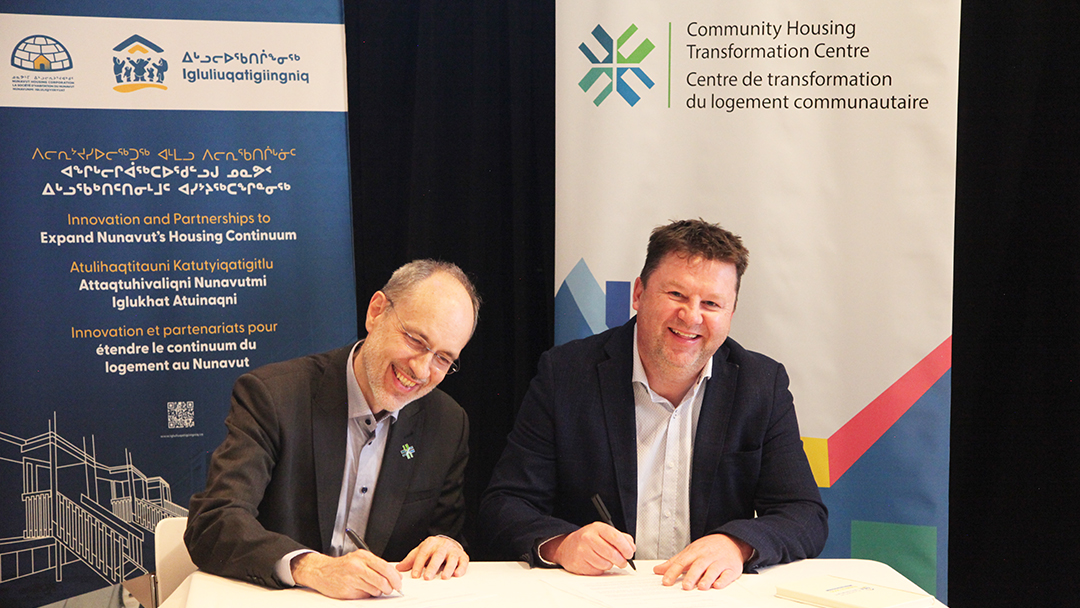
Since then, momentum has been building. The Nunavut and the Centre are currently actively working to operationalize an agreement signed in late March 2023 to establish a Community Housing Growth Fund. The Nunalingni Piruqpaalirut Fund (NPF), meaning growth in our land in Inuktitut, is part of Nunavut 3000, an ambitious development plan launched by the Nunavut Housing Corporation (NHC).
This fund will help address the systemic challenges of housing in Nunavut. Like many regions north of the 60th parallel, Nunavut is struggling with a housing shortage that has led to overcrowding at particularly high rates. The fund will provide support for solutions to this issue, as well as for enhancing the diversity and the quality of the housing supply.
Following the Growth Fund model, NPF consists of three components. The capacity building component will offer grants to assist in the development of organizations and establish a sustainable foundation for growth. The planning and pre-development component will cover the beginning stages of construction projects and facilitate access to capital from the Nunavut 3000 plan and other funding sources. Lastly, the research and innovation component will support projects that promote innovation, education, and knowledge transfer in the housing sector.
One million dollars was provided by NHC under a renewable agreement and we expect to begin the allocation process by the end of 2023. Our ambition is to allocate 20 to 25 projects by March 2024 in the territory of 15,000 households.
Projects related to reconciliation with Indigenous peoples
Over $1.6 million has been allocated to 25 projects. 21 were awarded to organizations with an Indigenous clientele and 9 were awarded to Indigenous-led organizations. In total, more than 81,000 units are impacted by this support.
Most of the grants for this priority come from the CBTI fund (44%), which accounts for just over half of the projects (13). The CBTI fund predominantly fulfilled the needs of organizations working in challenging environments with precarious populations, as well as tenant groups. It primarily focused on meeting basic needs related to inclusion, advocacy, education, and community engagement. Therefore, a significant portion of projects under this priority targeted vulnerable, poorly housed, and marginalized groups. This analysis is further supported by the fact that 19 out of the 25 indigenous projects also address social inclusion.
It is concerning that the CBTI fund is so closely linked to the housing needs of Indigenous individuals, considering that the Canadian government has decided not to renew it. The CBTI was the only National Housing Strategy fund exclusively dedicated to social inclusion and community action. This decision will undoubtedly have a negative impact on the Centre’s financial capacity to work towards reconciliation and poses a broader risk of negatively affecting the most vulnerable Indigenous people.
In the spotlight
A new approach to support services in housing
To counter homelessness and the housing shortage in Flin Flon, Manitoba, the Flin Flon Housing Initiative has chosen a new approach. Thanks to a $38,000 grant from the Sector Transformation Fund, the Flin Flon Aboriginal Friendship Centre aims to create supportive housing and address the shortage of affordable housing.
This initiative, which mobilizes many community players including the city of Flin Flon, was motivated by the findings of a study published in 2014 by the University of Winnipeg. The study highlighted the severity of homelessness-related problems coupled with a lack of adequate housing in the region. The situation has persisted since then and is likely to worsen, due to plant closures and a shortage of jobs in the region.
The Flin Flon Aboriginal Friendship Centre has received support from the Community Housing Transformation Centre to create a business strategy in collaboration with a consultant and the Everyone Deserves a Home Community Committee working group. The objective is to create more affordable housing, incorporating a range of support services.
This fast-growing organization takes a community-based approach, working with local stakeholders to develop solutions that meet real community needs. It is developing its services for the Indigenous communities of Flin Flon and, for the first time, integrating environmental considerations into housing construction.
An Indigenous-led response to the crisis of Indigenous homelessness in Thunder Bay
Seeing how Indigenous homelessness within the city of Thunder Bay has become a growing phenomenon, this project provides the Matawa Chiefs Council (MCC) and the Matawa Non-Profit Housing Corporation with the capacity to develop solutions to the issue of Indigenous homelessness in Thunder Bay.
Homelessness is often mixed with complex social determinants of health, addictions, racism, historic trauma, or abuse. To take these aspects into consideration, the project aims to address the issue of Indigenous homelessness from an angle that respects the cultural value system of the communities in question.
It aims to find solutions to the problem, starting by providing a full-time Matawa Homelessness Policy Analyst for one or two years.
The project also uses an approach that considers the shared lived experience of systemic barriers due to colonization. The homeless and precariously housed will be directly involved in the project’s design and implementation.
The organization successfully completed the outreach reorganization in their region ensuring a larger number of community members will have access to services on a yearly basis.
The Centre’s Funds

The Community-Based Tenant Initiative Fund
After months of meetings and, numerous letters from partners and recipient organizations expressing their support for the renewal of the Community-Based Tenant Initiative Fund (CBTI), we received news on October 28 that the Treasury Board rejected the request to renew the funding until 2028.
The CBTI fund garnered significant interest and had a positive reputation within the sector. The quality and impact of the projects supported by this fund have proven its relevance, especially in provinces where tenants are ill-equipped to defend their rights. Unfortunately, the CBTI was the only fund under the National Housing Strategy exclusively dedicated to social inclusion and community action.
Most requests for CBTI funding came from organizations working with vulnerable populations and tenant groups. They aimed to address essential needs such as inclusion, advocacy, education, and community engagement.
The end of the CBTI fund will have a detrimental impact on the most vulnerable populations, particularly in Black and Indigenous communities. This decision will certainly affect the Centre’s financial capacity to work towards inclusion and for reconciliation with Indigenous peoples.
The last applications were received in January 2023, and all available funds were allocated by March. All files will be closed, and a final report on the CBTI fund will be submitted to CMHC in March 2024.
Grants awarded through the Community-Based Tenant Initiative Fund
In 2022–2023, the CBTI Fund supported 82 projects, allocating over $2.9 million to impact more than 90,000 units. The fund accounted for 35% of the total funding allocated during the year.
The CBTI Fund is the Centre’s primary funding source for three key priorities: social inclusion and community action, improving the sector’s eco-responsibility, and reconciliation with Indigenous peoples. It subsidizes the total cost of projects in these areas by 62% (64 projects), 47% (37 projects) and 44% (13 projects) respectively.

The Sector Transformation Fund – Local Projects
The local projects stream of the Sector Transformation Fund supported beneficiaries in developing their organizational capacity, creating new services and partnerships, improving strategic plans and business planning processes to achieve their mission.
In 2022–2023, this fund supported initiatives aimed at growth, innovation, and inclusion. Like the previous fiscal year, most funded projects were focused on strategic planning. A significant number of grants have also been used to structure new initiatives, including land trusts, acquisition projects and resource pooling projects.
Grants awarded through the Sector Transformation Fund—Local Projects
A total of 50 projects, benefiting over 30,000 households, received funding of more than $1.7 million. Compared to the previous year, this represents a decrease of approximately 42% in allocated funds. However, in terms of the number of units impacted, there was an increase of about 300%.
When considering the average funds allocated per tenant household, Newfoundland and Labrador and Prince Edward Island have the highest amounts at $5.03 and $3.25, respectively. The average for Canada is $0.40 per tenant household.
Rapid Housing Initiative
The Centre provided support to 9 groups who applied for CMHC’s Rapid Housing Initiative (RHI). Among these groups, five were from the Prairies. They all received up to $30,000 each to develop their program proposals.
A total of $225,000 was allocated, resulting in the creation of 191 housing units. On average, this amounts to approximately $0.05 per household in Canada.

The Sector Transformation Fund – Sectoral Impact Projects
The Centre is pleased to report that the impact of this stream of the Sector Transformation Fund is significantly higher than in previous years. The Centre is striving to bring about a change in scale at all levels of the sector’s action, and it is largely through this fund that it intends to achieve this.
Even though we have supported several quality projects through this fund in the past, we found that their sectoral impact was not as widespread as anticipated. In 2022–2023, we decided to prioritize the funding of major projects carried out through the coordinated action of several stakeholders. We have maintained our support for ideas designed to transform the approach to financing, and for projects that increase the sector’s capacity to act.
Grants awarded through the Sector Transformation Fund—Sectoral Impact Projects
In 2022–2023, the Centre provided over $3.7 million in funding to 19 projects through the STF—Sectoral Impact Projects, providing an average of $0.57 per tenant household in Canada. These projects affected over 25,000 units.
Out of the allocated amounts this year, 58% was dedicated to fostering growth within the sector. This stream of the STF has played a vital role in supporting two of the Centre’s main priorities: sector growth, and resilience and innovative practices. It has accounted for 55% of the projects related to sector growth and 38% of the projects focused on resilience and innovative practices, comprising a total of 17 and 18 projects, respectively.

Nova Scotia’s Community Housing Growth Fund
The Centre’s contribution to this fund has significantly enhanced its intervention capacity in the province. During the 2021–2022 fiscal year, the Centre funded a total of 6 projects. This number has now increased to 30, with 21 of those receiving grants from the Nova Scotia Community Housing Growth Fund (CHGF). A total of $850,000 was invested in the province over a period of 6 months.
This agreement has not only expanded opportunities within the housing sector in Nova Scotia but has also facilitated several advancements for the Centre as an organization, both with our IT infrastructure and the diversification of our funding sources. Additionally, this agreement has allowed us to establish a permanent presence in the province through the hiring of a new program manager.
For more information on the CHGF, see Introduction.
Grants awarded through the Nova Scotia Community Housing Growth Fund
In 2022–2023, the CHGF has awarded grants to 21 projects involving 671 units for a total of over $850,000.
Planning and pre-development has been the most important stream of the fund since it was launched, both in terms of the amounts allocated (69%) and the number of projects accepted (67%). In 2022–2023, projects were focused on leveraging existing resources (33%), addressing systemic barriers (30%), and building capacity (17%).

Effective organizational management of the Centre
The Centre is growing and evolving
2022–2023 has been full of surprises, unforeseen events, and new prospects. Like the previous three years, the Centre’s team has seized the opportunities that came our way. Our expansion, the resources we have shared, and the partnerships we have forged all bear witness to this.
In this context of effervescence and growth, strategic planning is a priority. The work we began with the consulting firm FOUG last year has continued, mobilizing the entire team. Our priorities are clarifying our transformation objectives for both the Centre and the sector, identifying the means to achieve them, and consolidating a strong and stimulating organizational culture.
Governance
A key indicator of good governance is the ability of leaders to reflect the needs of the constituents they represent. In the case of the Centre, this representation is strongly reflected in the members of the organization, as well as in the members of the Board of Directors and its committees. Each one of them brings their experience and expertise to the discussions, deliberations, and decisions. The direction set by this dedicated group of volunteers is the foundation upon which the Centre’s future is built.
Members of the Board of Directors and its four committees meet throughout the year to review the Centre’s work from a strategic perspective.
Each of the various committees is engaged in several tasks which, together, provide the necessary leadership and guidance to the organization’s operations. Individual members often contribute to more than one committee, in addition to the important work they do as Board members.
The Board met every quarter of the year. One of these meetings took place in person, in Toronto, and was attended by the Centre’s management team. This three-day meeting provided an opportunity to discuss the strategic planning for 2023–2024, and to meet with Ontario leaders in the sector to learn about their issues and concerns. The formal and informal exchanges held during the stay in Toronto were extremely enriching. They greatly contributed to the quality of the subsequent meetings and decisions taken, both in the committees and on the Board of Directors, propelling the Centre forward.
The board of directors

Jill Atkey
President

Lisa Oliveira
Vice president

Michelle Cooper-Iversen
Treasurer

Martina Jileckova
Secretary

Jacques Beaudoin
Administrator

Daniel Godin
Administrator

Kit Hickey
Administrator

Jaimee Gaunce
Administrator

Tim Ross
Administrator

Sandra Turner
Administrator
The cultural transformation underway!
Since 2022, the Centre’s staff has been everywhere from Vancouver Island to Nunavut and Prince Edward Island. They have given speeches, participated in panels, roundtables, workshops, seminars, and other meetings.
This has enabled us to achieve unprecedented outreach. All these activities were opportunities to promote the cultural transformation of the sector, drawing attention to Plancher and the Growth Fund in particular, but also to the Organizational Compass and several other services.
They were also opportunities to hear inperson feedback from grantees. We heard that our actions have a significant impact across the country. Many people we encountered shared their stories of successful projects and interventions in their communities, thanks to our support.
In 2022-23, the Centre engaged in some 43 local, provincial, territorial, and national conferences. We sponsored many of them and hosted information booths.
Any effort at cultural transformation requires the support of a communications plan. The summer of 2022 was a time to review our tools and reorganize our various systems. The opportunity also prompted a reconsideration of the organization of the team’s operations. The result is a well-structured communications plan that will provide a framework for the Centre’s communications actions in the years to come.
The plan revolves around repositioning the Centre in Canada’s housing ecosystem as a catalyst for the growth of community housing sector. Until now, we have been known primarily as a funder. Since 2022–2023, we have been presenting ourselves more as bold and innovative leaders. Therefore, we have shifted our focus from promoting our funds to highlighting our major initiatives, our services and the expertise of our team.
To reflect this transition, we have completely redesigned our website. It has moved away from the simple promotional process (visit us and enquire about funding) to more intensive content, highlighting the propositional contribution the Centre makes to the sector. It has also been redesigned to be more user-friendly, straightforward, and more practical.
The Resource Inventory, mentioned in the introduction to this report, is undoubtedly one of the more significant additions to the site. In addition to offering almost 1,000 resources for housing providers, we aim to use it to spark conversations within the sector, stimulate the sharing of knowledge and expertise, and foster the development of communities of practice.
The Centre newsletter has been redesigned in the same spirit. It continues to produce excellent results, with open and click rates well above the average for NPOs. It therefore continues to attract the interest of our readership, whose numbers we aim to increase in the months to come.
A successful investment for community housing
Investment in the Centre’s IT structure continued throughout 2022–2023. Our IT team has been supported by the consulting firm Namtek to adapt our systems to the organization’s rapid growth. To date, we have completed an ecosystem review of our IT platforms, from both a user interface and internal systems perspective.
This significant effort is more relevant now than ever with the agreements signed in Nova Scotia and Nunavut (CHGF and NPF), as well as the development of the Resource Inventory and the Organizational Compass action plan generator.
We would also like to highlight our collaboration with Vivre en Ville on the creation of a national lease registry. This registry will prove to be a highly practical tool to support tenants during lease negotiations. In addition to being a member of the project’s advisory committee, the Centre is responsible for its data hosting and operation until 2028.
We have also partnered with Housing Assessment Resource Tool (HART) to host and deliver an interactive online course. It aims to support the use of their housing needs measurement tools for the different stakeholders in the affordable housing ecosystem through instruction.
The Centre is therefore keeping its promise to put its IT system at the service of community housing.
The team
At the heart of the Centre’s success is the expertise of its team. Over the years, the energetic and committed work of each of its members has become the Centre’s hallmark in the housing sector.
Thanks to its agility, the Centre can seize many of the opportunities that arise. This has contributed to a significant increase in the number of employees, from 17 to 27, in just one year.


















Closing remarks
It will take time and perseverance to transform the housing sector. The Centre is committed to playing a catalytic role in the growth of the community housing sector, with a view toward extending this model across the country. Our resources, our expertise, our team, our partners and allies, and our strategic plan create an exceptional context for achieving this goal. It is essential that we proactively use these assets to achieve their full potential.
Our ambition is clear: we want to establish the community housing sector as a leader in Canadian society. To achieve this, a radical cultural transformation is required. Community housing must become a desirable housing model for all, not just those who are disadvantaged.
The challenge facing the Centre in the years ahead lies in strengthening its leadership as a facilitator, an inspirer, and an enabler of the sector’s capacity for action. This is particularly important at a time when housing is a major concern in both the public and the political spheres.
Boldness and innovation will continue to drive our action throughout 2023–2024, because without them, our vision cannot be achieved. And in our commitment to succeed, we reassert our will to progress by continually evolving our practices!







